Special Report
Places With the Biggest Snowfall in History in Every State
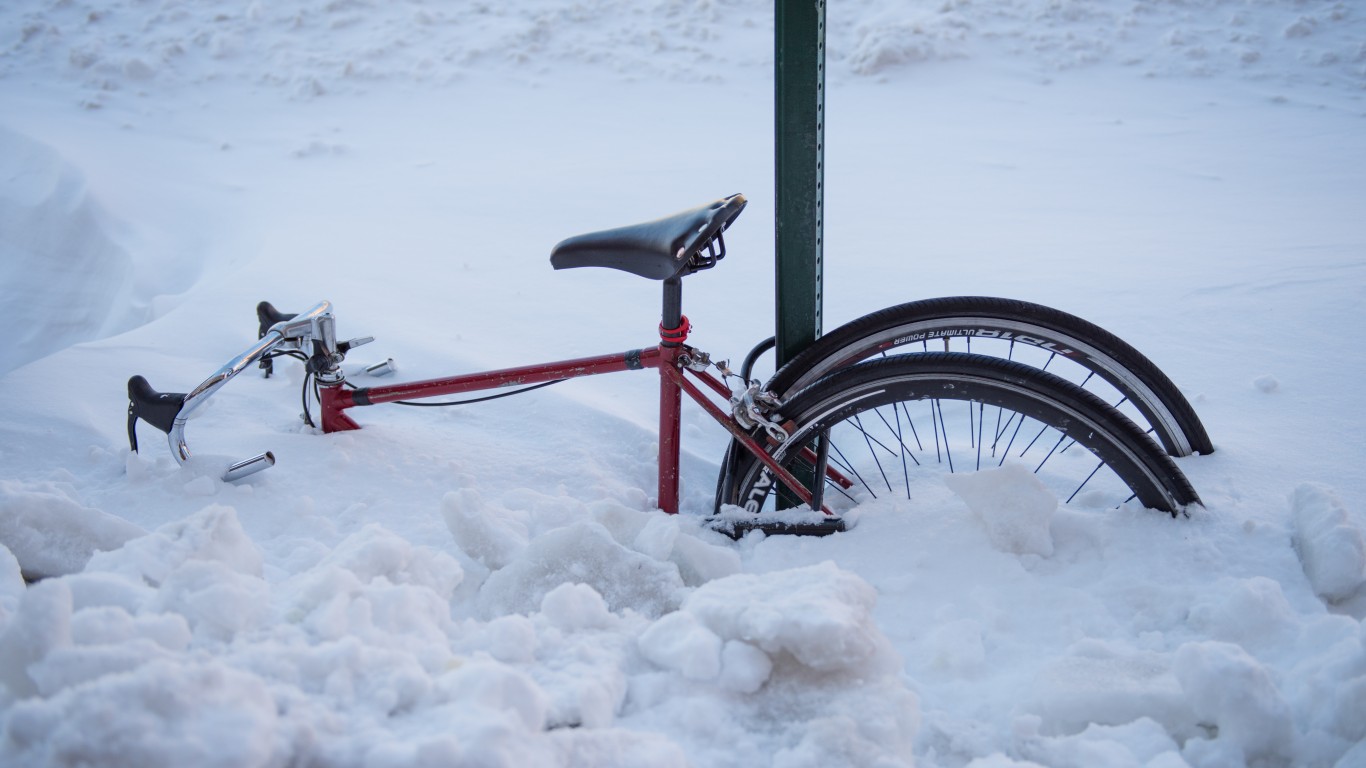
Published:

The first snow has arrived or is just around the corner across much of the United States. This year, however, the cheerful anticipation of the holidays that usually accompanies this time of year is tinted with concerns of the pandemic getting worse during the colder months.
The death toll from COVID-19 has already surpassed one-quarter of a million in the United States. Here are the places in every state where COVID 19 is growing the fastest right now.
The U.S.’s path through the pandemic may be unclear, but troves of government weather data can certainly help provide some context for a more familiar winter experience: snowfall. Based on how U.S. winters have been trending amid the rapidly progressing effects of climate change, most places are not likely to see anything close to their state’s record snowfall this year — or anytime soon.
Of the 130 weather stations that reported the biggest snowfall records — all 3 feet or greater — 112 reported these records before the year 2000. In 37 of 50 states, the biggest single-day snowfall occurred before 2000.
The all-time record for snowfall was set in Boulder County, Colorado, in 1921, when a blizzard delivered a whopping 6 feet, 4 inches of snow in 24 hours.
24/7 Wall St. reviewed one-day snowfall extremes recorded by the 3,061 weather stations across the United States. We compared each state’s maximum snow record at all weather stations to find the biggest single-day snowfall record in every state. Weather station data by county is published by the National Centers for Environmental Information (NCEI) at the National Oceanic and Atmospheric Administration (NOAA).
According to an analysis of U.S. weather station data from 1930 to 2007 by the Environmental Protection Agency, climate change has contributed to a decrease in total snowfall in many parts of the country. Of the weather stations reviewed by the EPA, 57% showed a decline.
Click here to see the places with the biggest snowfall in history in every state.
Click here to see our detailed methodology.
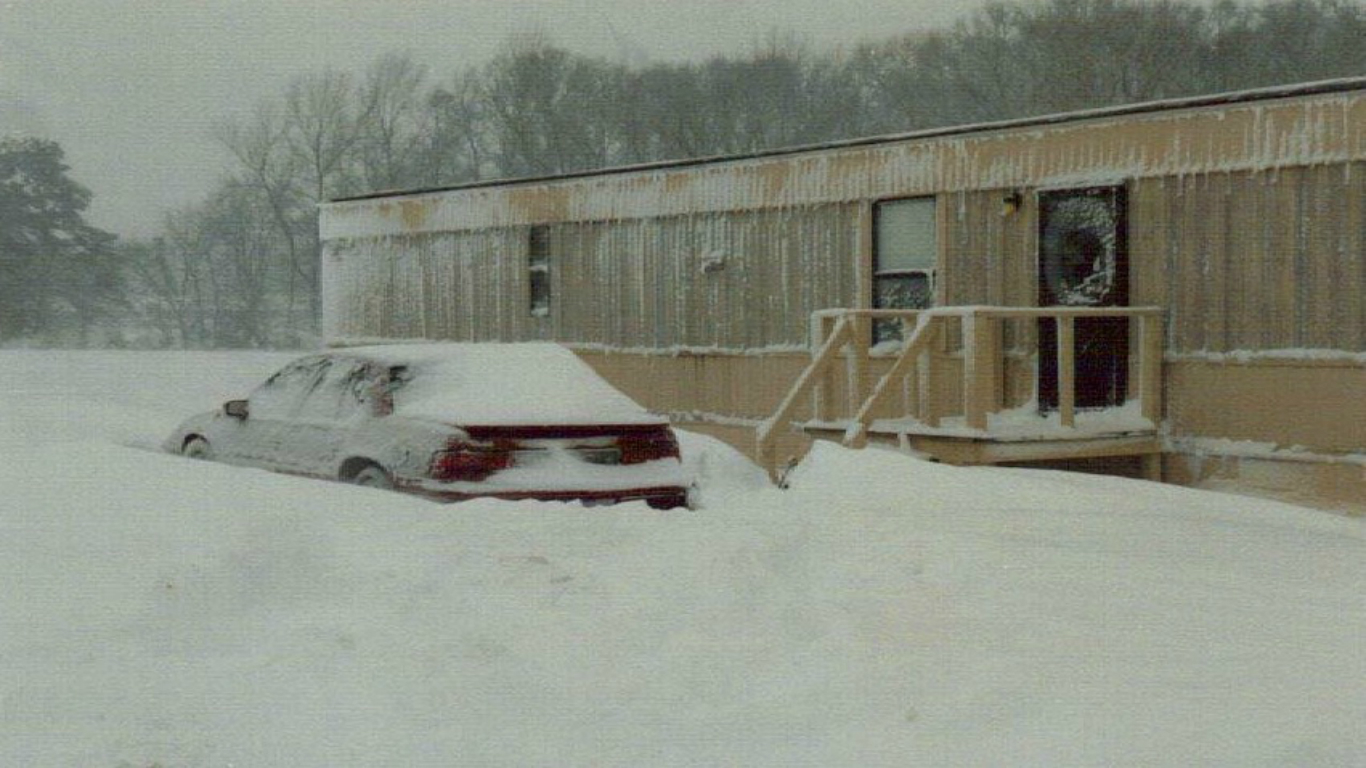
Alabama: Etowah
> County population: 102,939
> 1-day record: 1 foot, 8 inches on Mar 13, 1993
> Station reporting: Walnut Grove
> Station elevation: 259 feet
On March 13, 1993, the Walnut Grove weather station in Etowah County, Alabama, recorded nearly 2 feet of snowfall in 24 hours. This remains the largest one-day snowfall event in Alabama’s history based on over a 100 years of data at this and the 66 other weather stations in Alabama counties.
Compared with weather stations nationwide, just over 800 single-day snowfall extremes since 1900 exceeded that of Alabama’s Etowah county.
[in-text-ad]
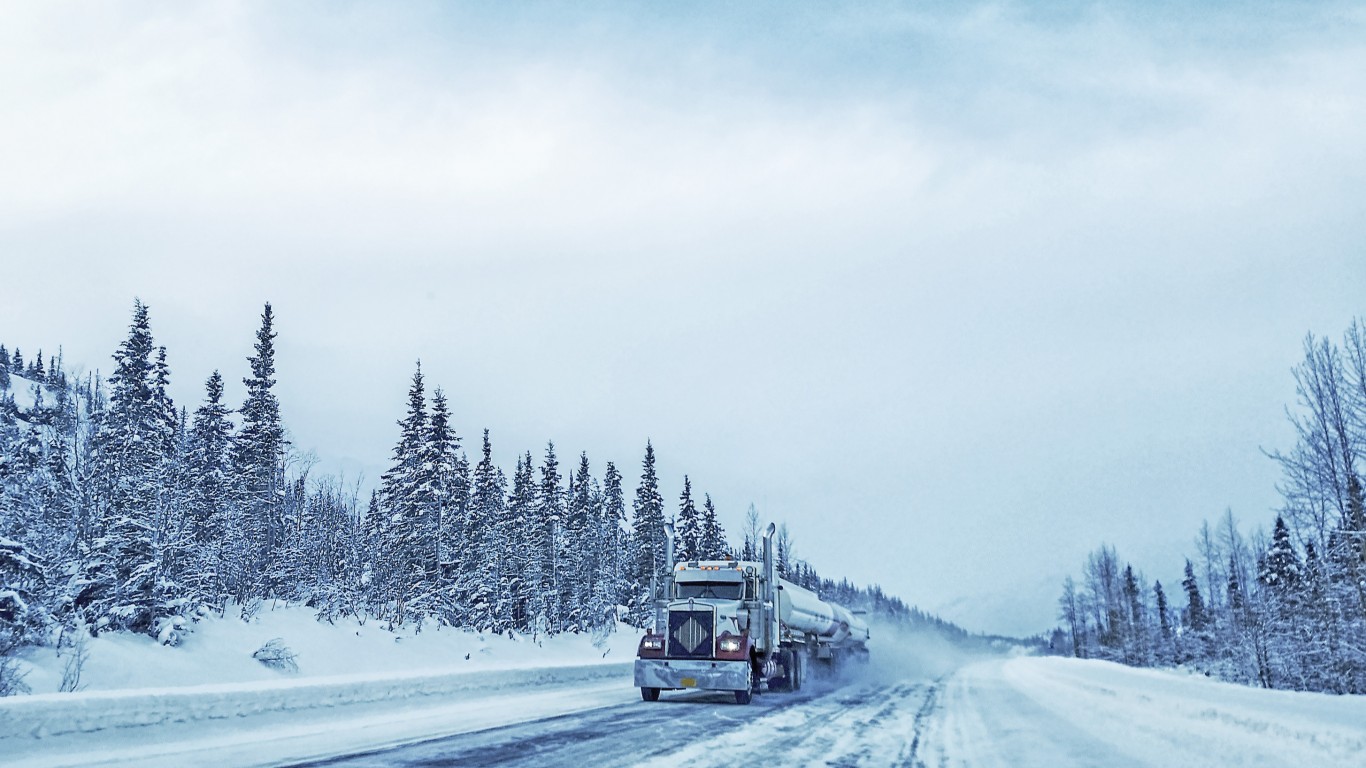
Alaska: Valdez-cordova
> County population: .
> 1-day record: 5 feet, 2 inches on Dec 29, 1955
> Station reporting: Thompson Pass
> Station elevation: 763 feet
Alaska’s all-time snowfall record was set in Valdez-Cordova county on Dec. 29, 1955. Snowfall across Alaska that winter was slightly lower than normal up to that point. Then, over 5 feet of snow fell in less than 24 hours at the Thompson Pass weather station — the eighth largest single-day record of all U.S. counties to date, and the second-largest recorded that year. Pierce County Washington’s Rainier Paradise weather station, at more than twice the elevation of Thompson Pass, recorded 5 feet, 10 inches of snow on Nov. 26, 1955.
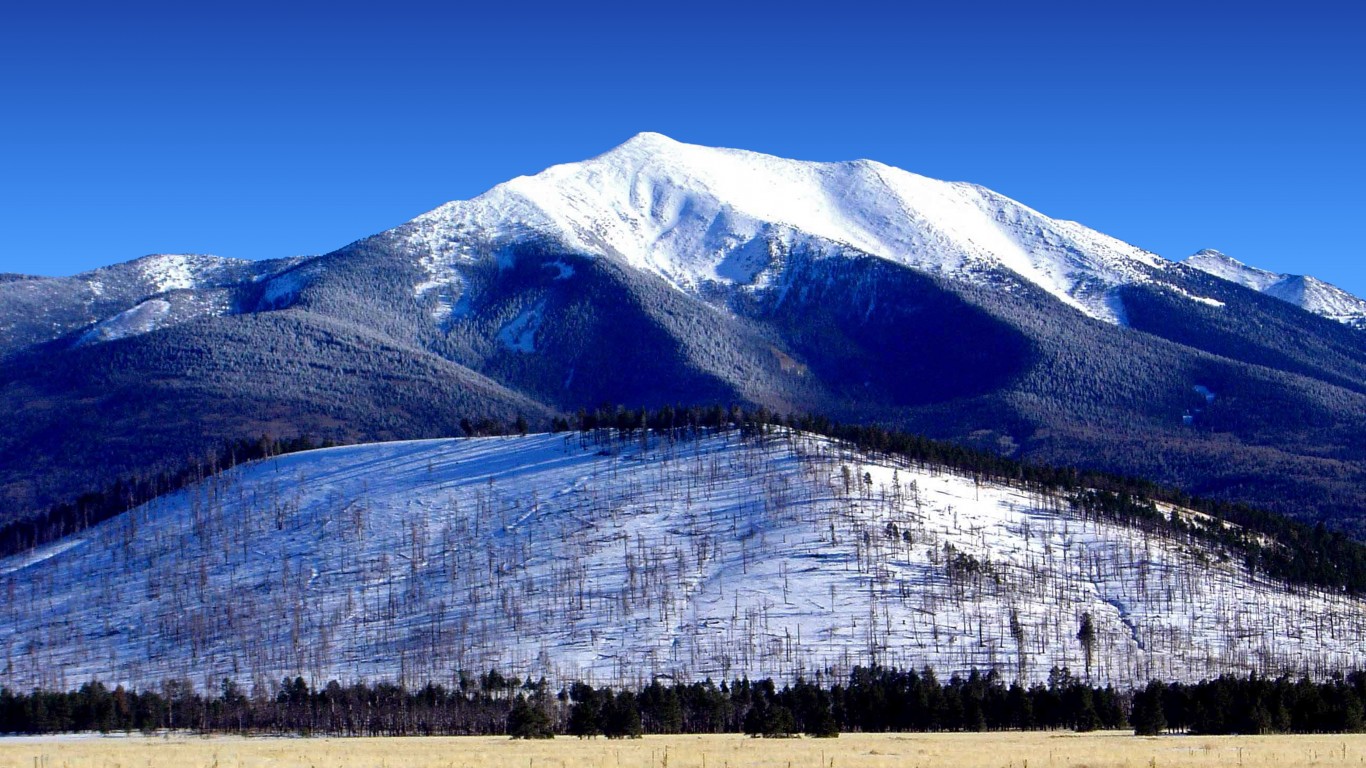
Arizona: Coconino
> County population: 140,217
> 1-day record: 3 feet, 6 inches on Jan 21, 2010
> Station reporting: Flagstaff
> Station elevation: 2,121 feet
As climate change progresses, record snowfalls in the United States are becoming harder to break. The vast majority of single-day record snowfall across the nation and within states were set prior to the year 2000. But in Arizona, the all-time state record of 3 feet, 6 inches was set on Jan. 21, 2010.
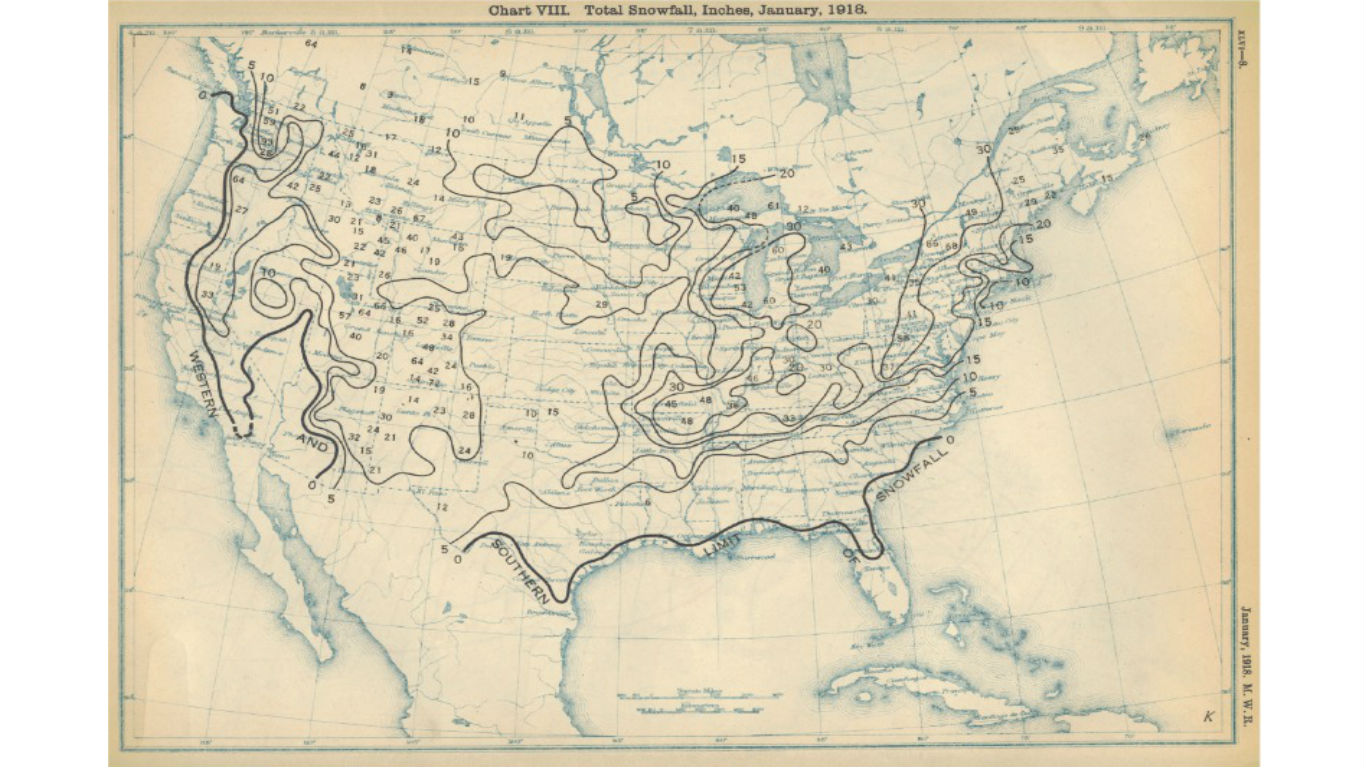
Arkansas: Clay
> County population: 15,061
> 1-day record: 2 feet, 1 inches on Jan 22, 1918
> Station reporting: Corning
> Station elevation: 91 feet
Based on snowfall data collected every day by weather stations in Arkansas’ 75 counties since 1900, Clay County had the single biggest day of snowfall on Jan. 22, 1918, when just over 2 feet of snow were recorded at the county’s Corning station.
Although most of the nation’s snowfall records tend to be older, few are this old. Clay’s Jan. 22 snowfall is one of the longest-held records in the country.
[in-text-ad-2]
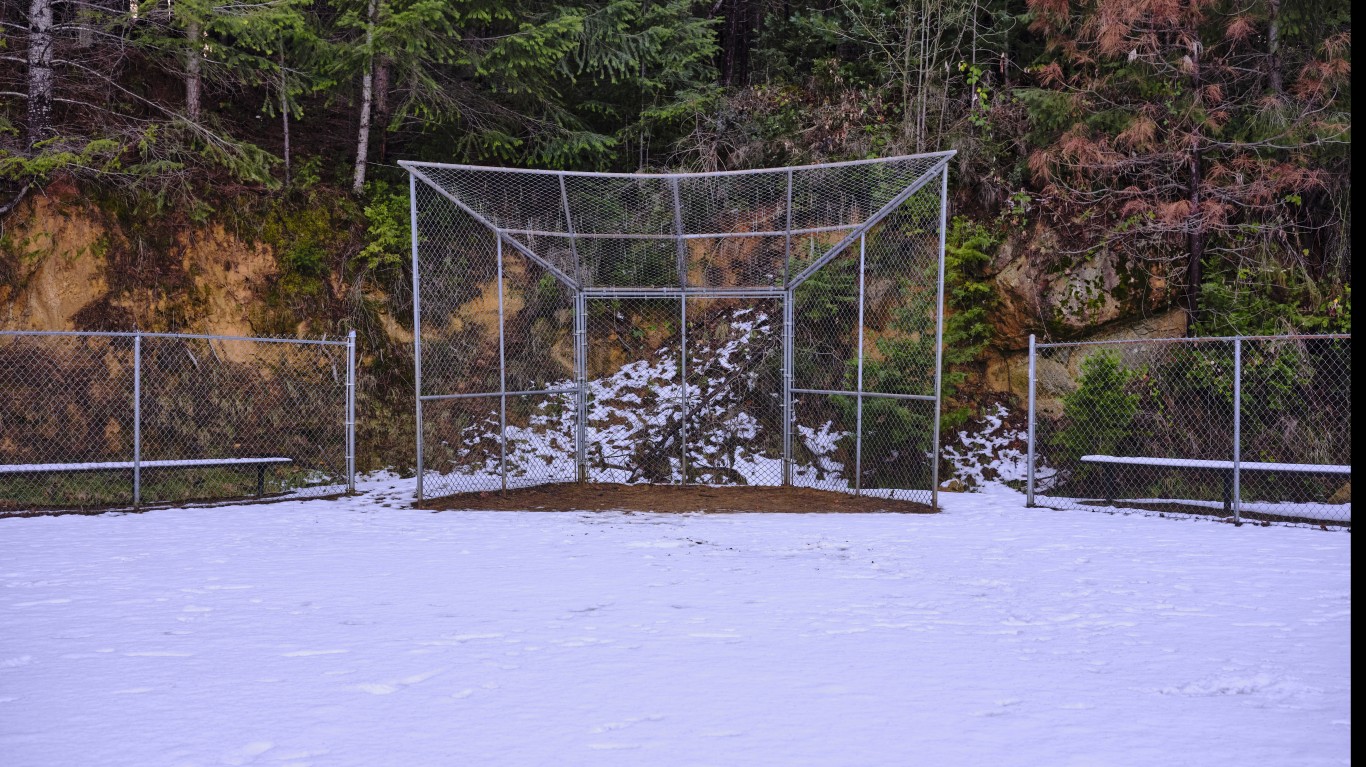
California: Yuba
> County population: 75,493
> 1-day record: 6 feet, 3 inches on Jan 14, 1952
> Station reporting: Camptonville
> Station elevation: 840 feet
California’s all-time snowfall record was set on Jan. 14, 1952 at Camptonville weather station, located on the northern edge of Yuba County near Tahoe National Forest. Six feet, 3 inches fell in a single day, the most in California’s history and the second most in U.S. history, trailing only the first place record in Boulder Colorado.
The snowstorm that tore across California and Nevada and brought the extreme snowfall was considered the worst winter weather in 50 years at the time.
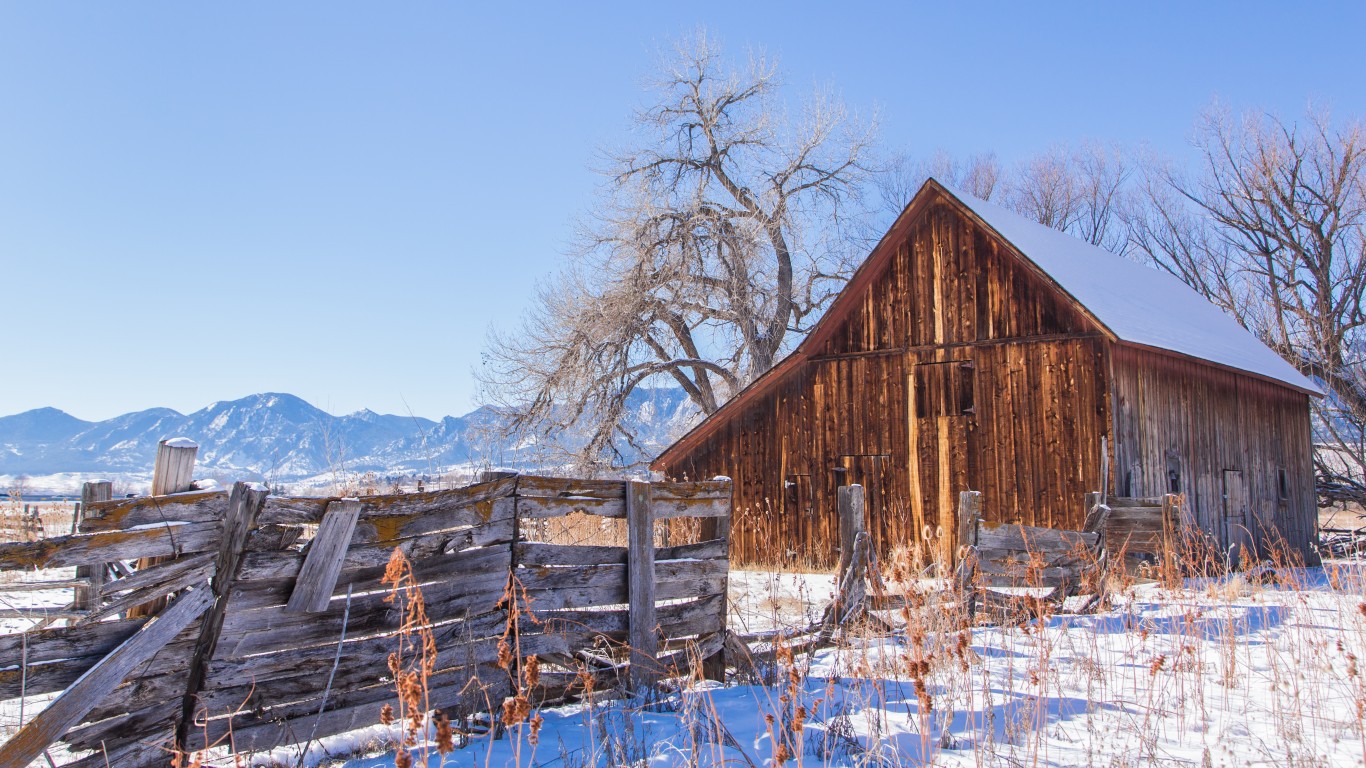
Colorado: Boulder
> County population: 321,030
> 1-day record: 6 feet, 3.8 inches on Apr 15, 1921
> Station reporting: Silver lake
> Station elevation: 3,158 feet
Colorado’s, and the nation’s, all-time record one-day snowfall was set by the weather station at Silver Lake, not far from Boulder, Colorado, in 1921, when a blizzard delivered a whopping 6 feet, 4 inches of snow in 24 hours. The storm continued to deliver its payload, with the measurement reaching 7 feet, 11 inches by the 32nd hour of snowfall. A Monthly Weather Review conducted in 1953 verifying the record confirmed the Silver Lake snowfall broke the four-day records as well, with 100 inches recorded over 85 hours, including breaks in the snowfall.
[in-text-ad]
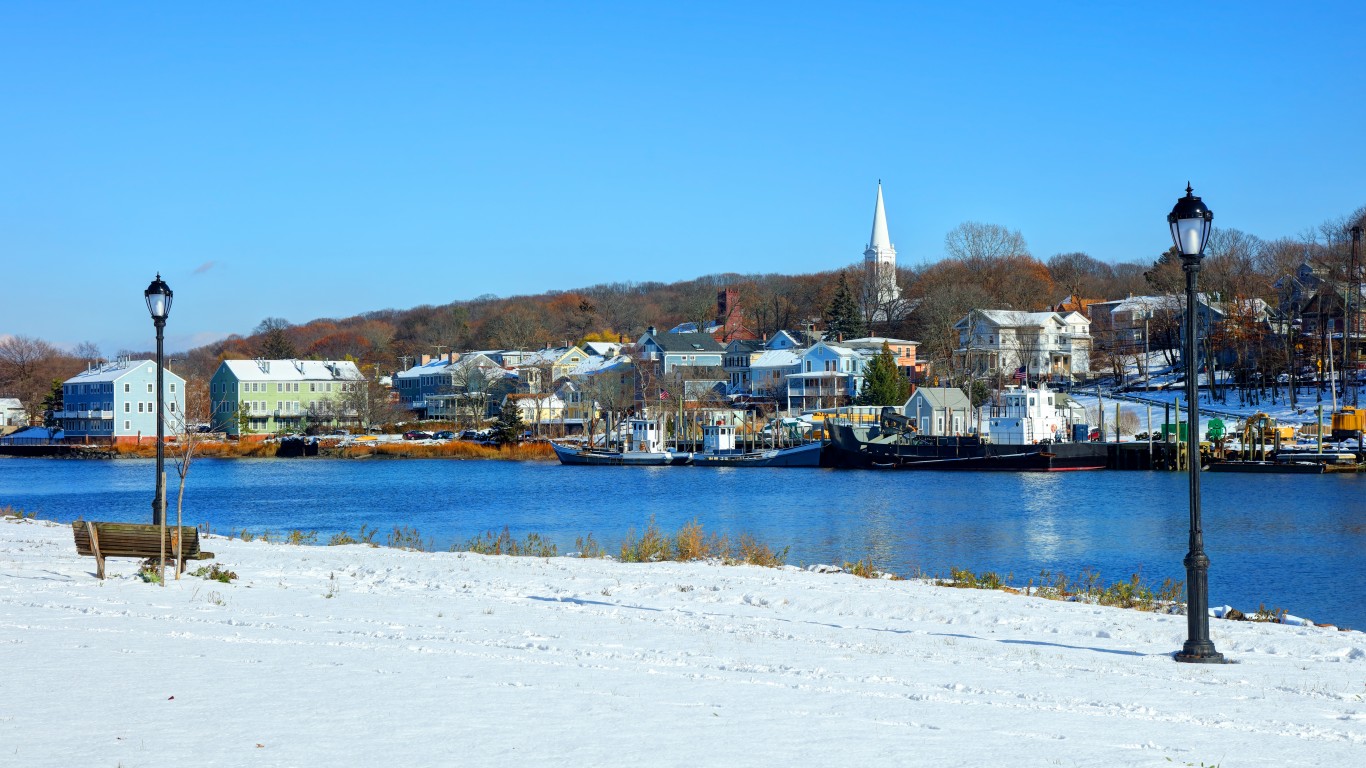
Connecticut: New Haven
> County population: 859,339
> 1-day record: 3 feet on Feb 9, 2013
> Station reporting: Ansonia
> Station elevation: 42 feet
Unlike most states, Connecticut’s biggest single-day snowfall occurred relatively recently. On Feb. 9, 2013, a blizzard slammed the state, dumping between 1 and 3 feet in the New Haven area. According to reports by the local paper New Haven Register, more than 650,000 homes and businesses lost power during the storm.
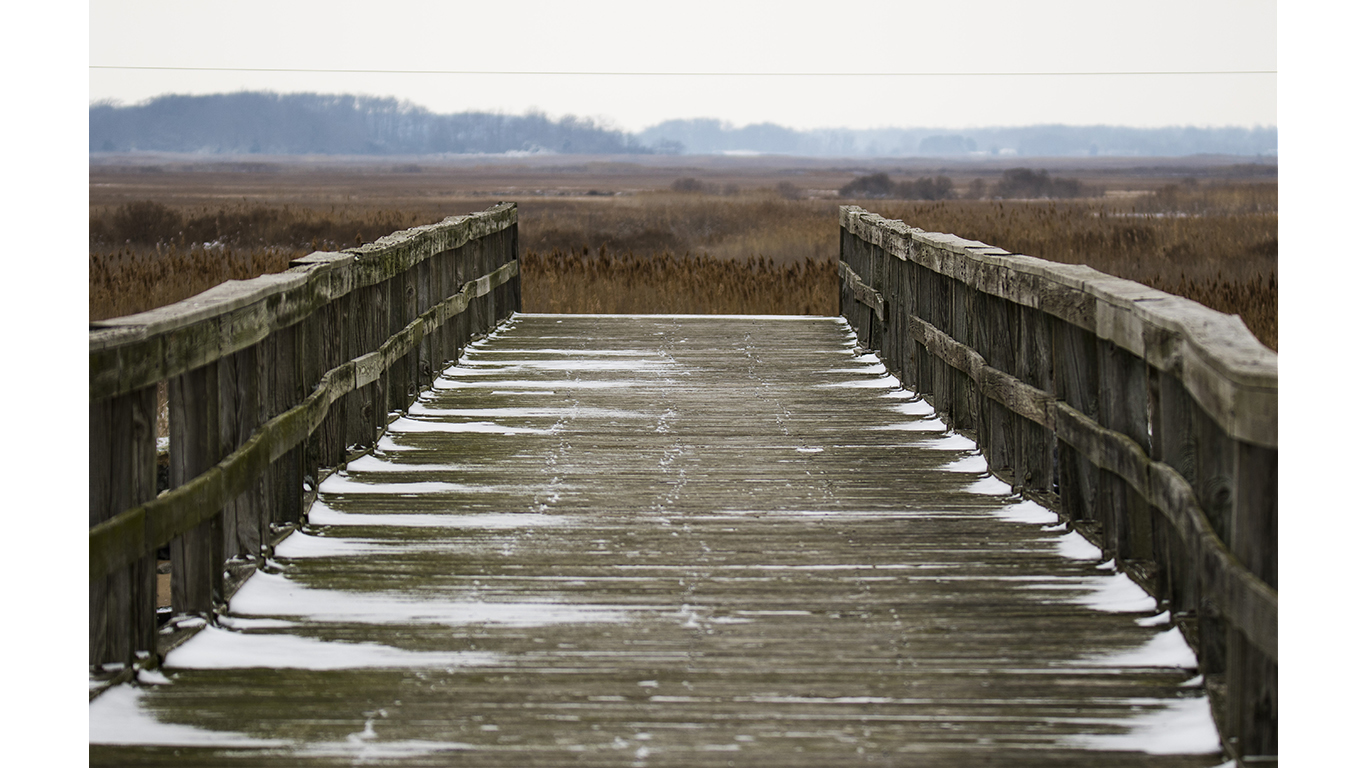
Delaware: Kent
> County population: 174,822
> 1-day record: 2 feet, 1 inches on Feb 19, 1979
> Station reporting: Dover
> Station elevation: 9 feet
No single-day snowfall documented since 1900 across Delaware’s three counties has surpassed the 2 feet 1 inch of snow that fell in Kent County during the President’s Day Storm of 1979.
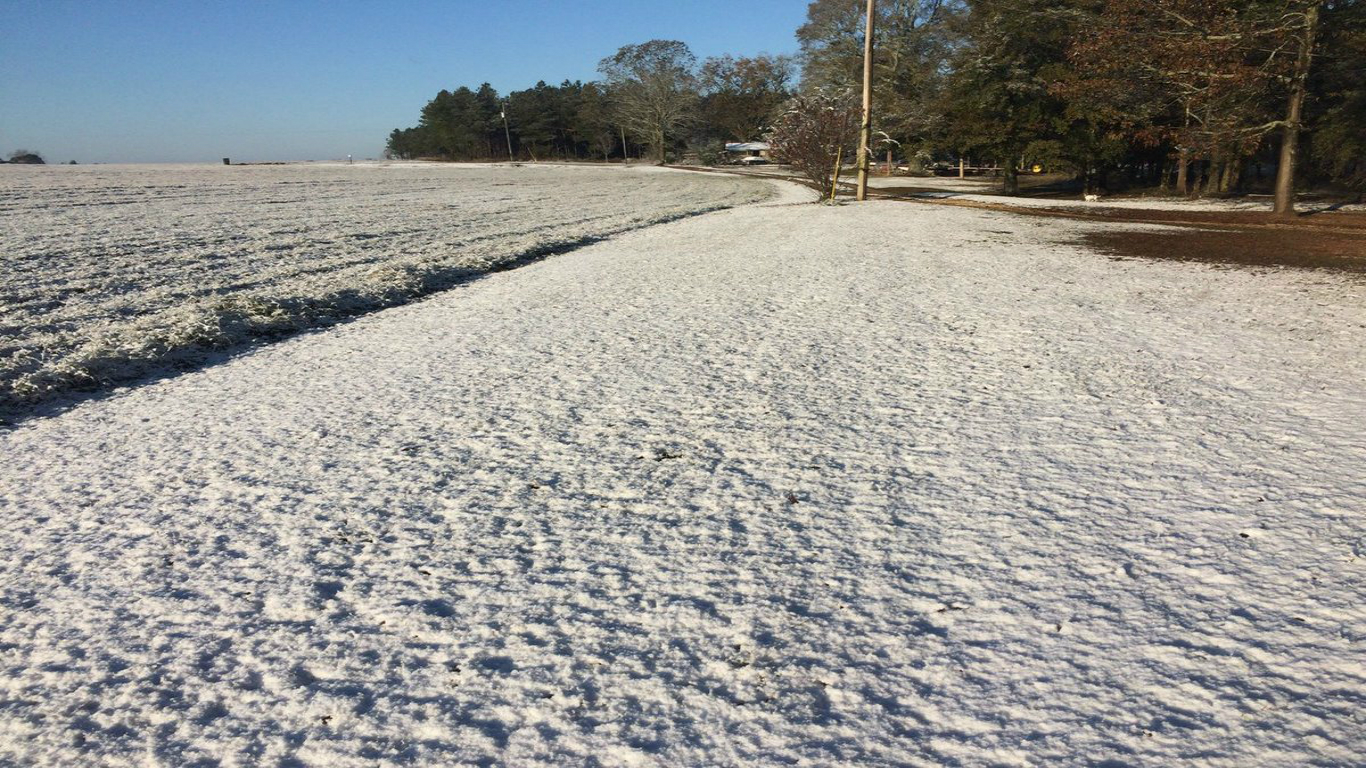
Florida: Santa Rosa
> County population: 170,442
> 1-day record: 4 inches on Mar 6, 1954
> Station reporting: Milton
> Station elevation: 66 feet
Florida’s historic snowfall in Santa Rosa is one of the smallest records set by any state. The 4 inches of snow over 24 hours is close to the smallest one-day extreme in the nation. The 35 Florida counties for which data is not available, comprising much of South Florida, are unlikely to have recorded more snowfall.
[in-text-ad-2]
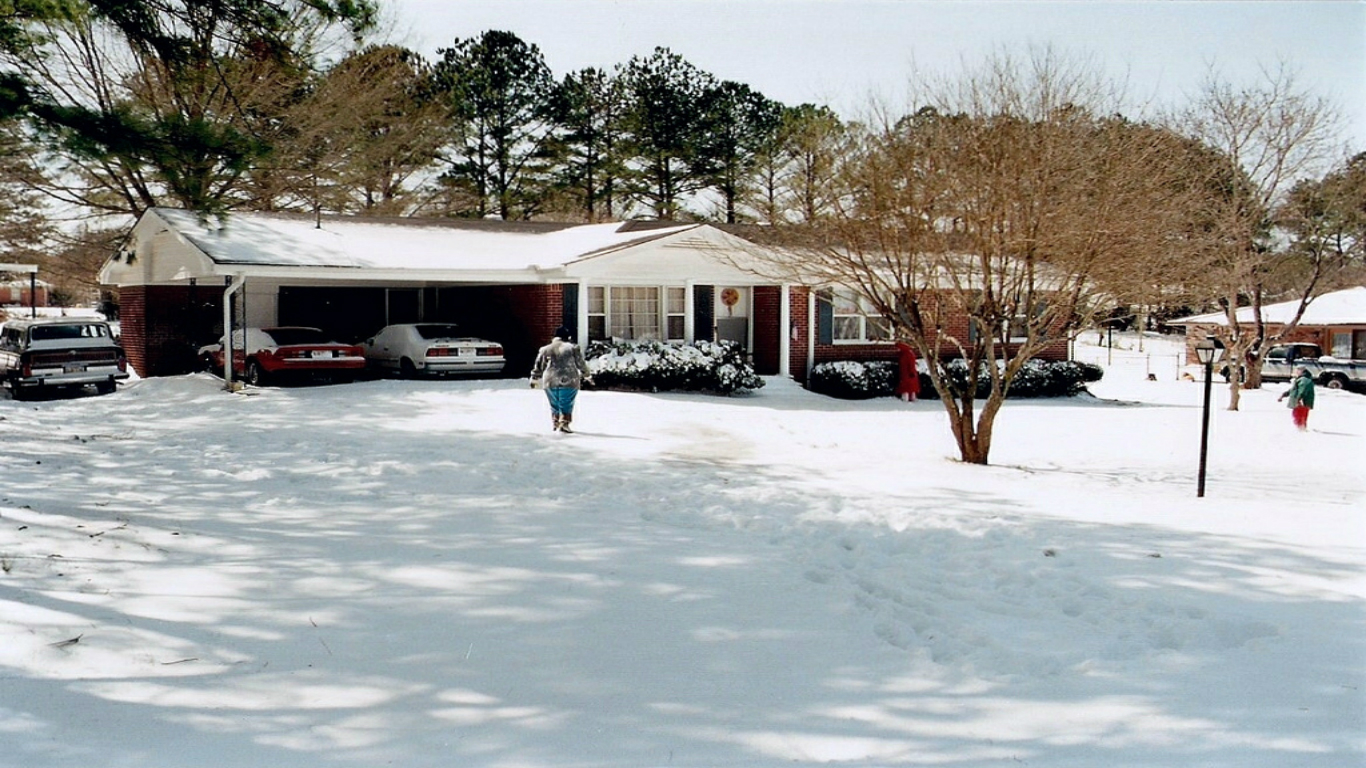
Georgia: Murray
> County population: 39,557
> 1-day record: 1 foot, 8 inches on Mar 14, 1993
> Station reporting: Beaverdale
> Station elevation: 226 feet
The storm that broke records in Georgia affected most of the eastern United States. The extratropical cyclone became known at the time as “The Storm of the Century.” On March 14, it dropped almost 2 feet of snow in Murray, more snowfall in a single day than in any other Georgia county throughout recorded history.
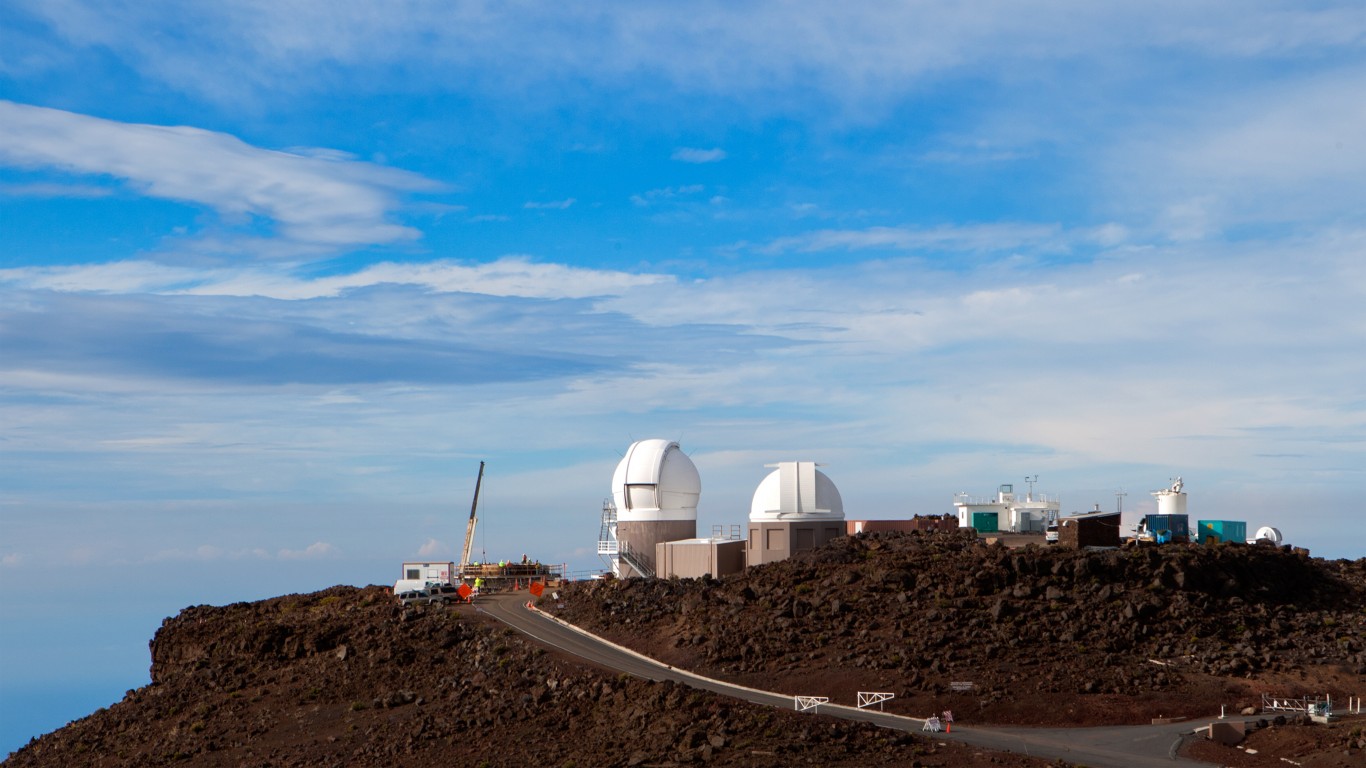
Hawaii: Maui
> County population: 165,281
> 1-day record: 6.5 inches on Feb 2, 1936
> Station reporting: Haleakali
> Station elevation: 2,974 feet
Hawaii is not known for its snowy winters. In fact, even on uninhabited mountaintops in the state, snow typically falls only once every five years. The 6.5 inch one-day record reported at the weather station on the HaleakalÄ volcano, at nearly 3,000 feet above sea-level, was highly unusual.
[in-text-ad]
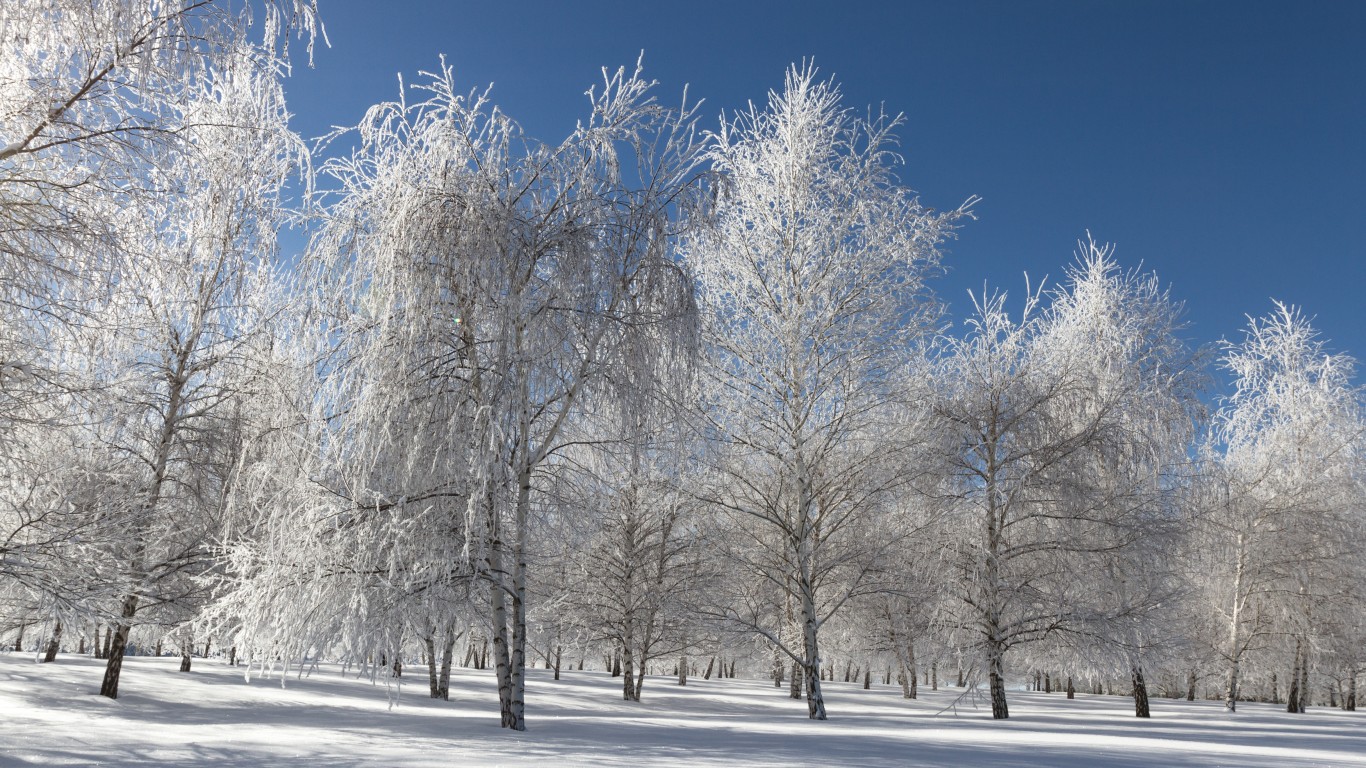
Idaho: Benewah and Owyhee
> County population: 9,086 and 11,455
> 1-day record: 5 feet on Jan 22, 1982 and May 2, 1983
> Station reporting: Tensed and Silver City
> Station elevation: 778 and 1,878 feet
Benewah and Owyhee counties are tied for the state’s biggest single-day snowfall, with an even 5 feet falling in each county on Jan. 22, 1982 and May 2, 1983, respectively.
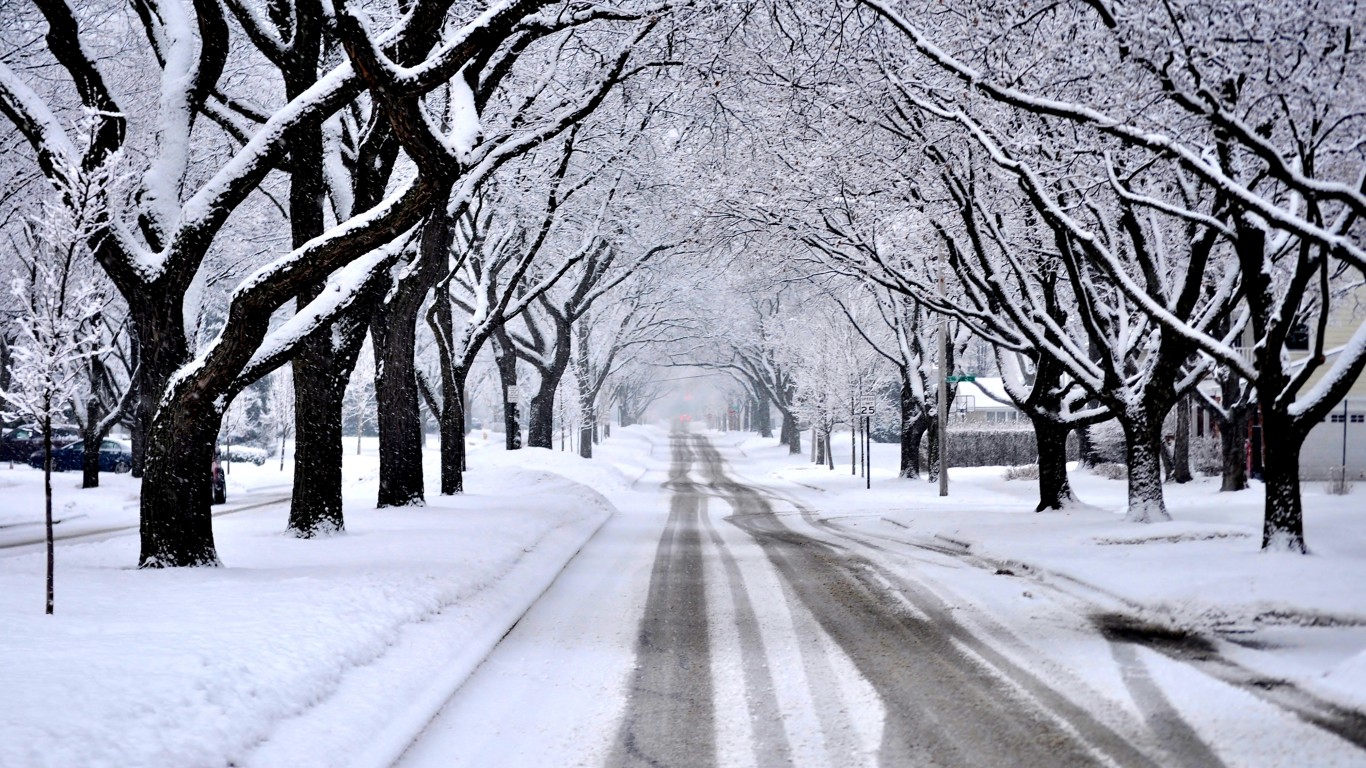
Illinois: Adams
> County population: 66,427
> 1-day record: 2 feet on Feb 28, 1900
> Station reporting: Coatsburg
> Station elevation: N/A
The one-day record reported by Adams County’s Coastbury weather station is one of only 23 in the country uncontested since 1900. According to a 1969 review of severe winter storms by the Illinois state government, the February 1900 storm was at that time one of the worst in Illinois since 1831, which was the worst winter on record since the state was established in 1818.
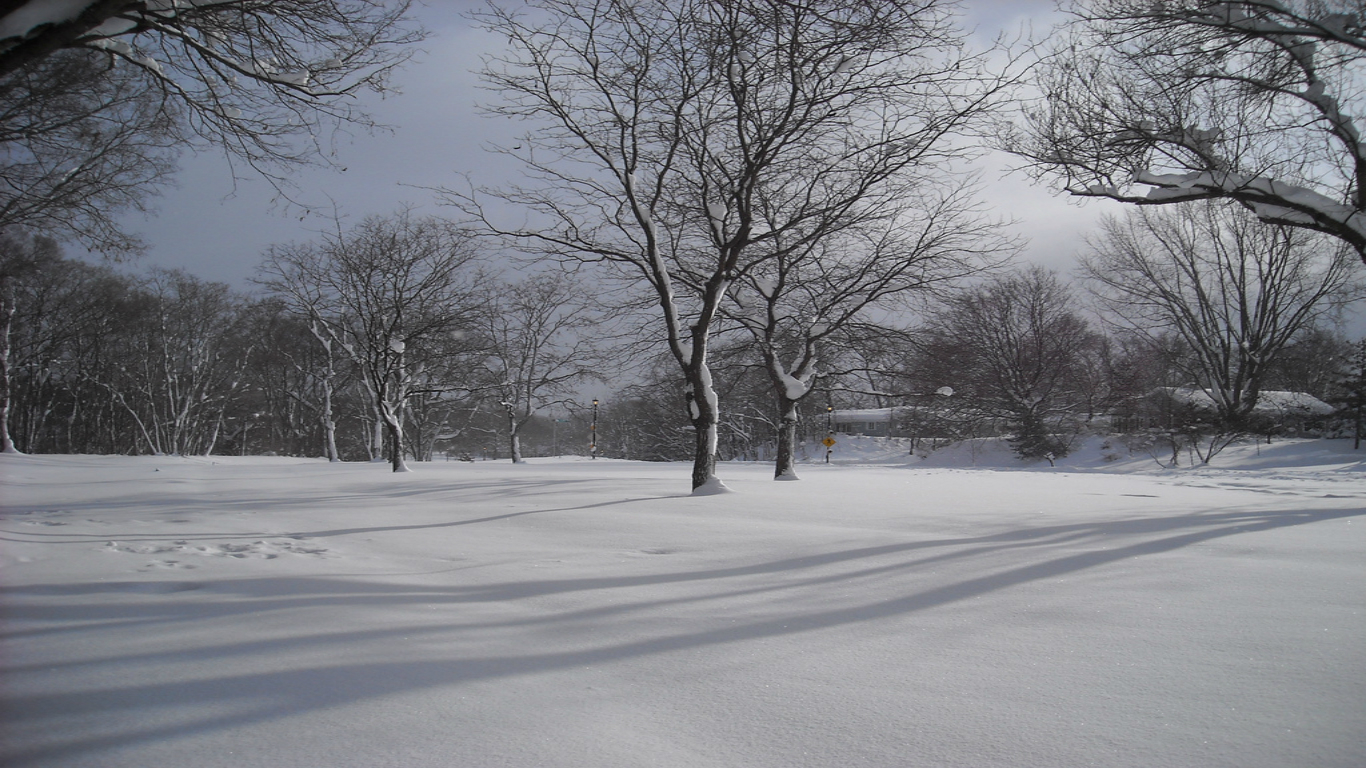
Indiana: St. Joseph
> County population: 269,240
> 1-day record: 2 feet, 2 inches on Jan 8, 2011
> Station reporting: South Bend
> Station elevation: 236 feet
The vast majority of one-day snowfall records across the country’s thousands of weather stations were registered prior to the year 2010, but in Indiana the record was set in 2011. Just over 2 feet of snow fell on the South Bend weather station in St. Joseph on Jan. 8.
[in-text-ad-2]
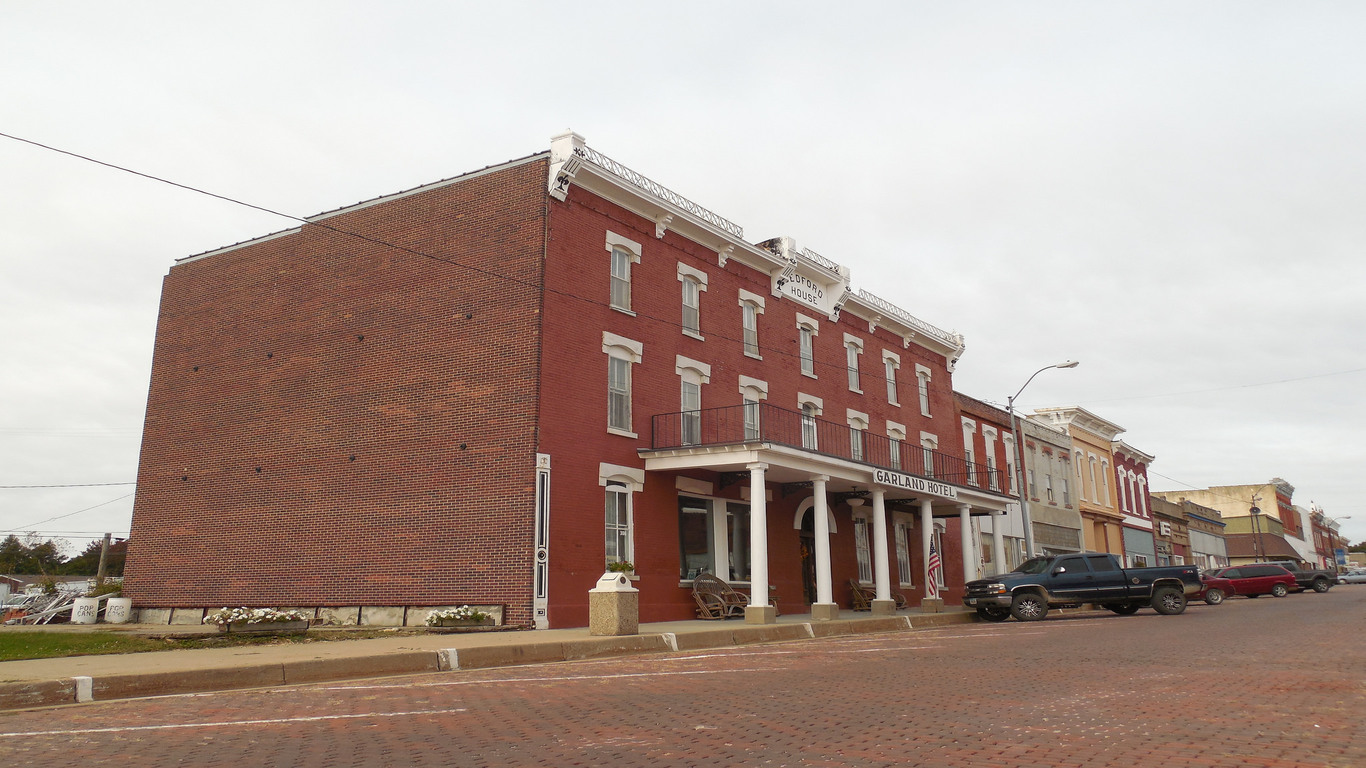
Iowa: Taylor
> County population: 6,201
> 1-day record: 2 feet on Apr 20, 1918
> Station reporting: Lenox
> Station elevation: 395 feet
The most snow recorded in a single day in Iowa was 2 feet at Taylor County’s Lenox weather station on April 20, 1918.
Already unusual for breaking snowfall records so late in the winter, 1918 was in other matters an odd weather year for Iowa. Just three days before the record was set in Lenox, a cold front in the region caused temperatures to plummet from 70 degrees F into the 20s. Across the state, in Fayette, Iowa, the one-day temperature difference of 56 degrees was at the time the largest ever recorded in Fayette.
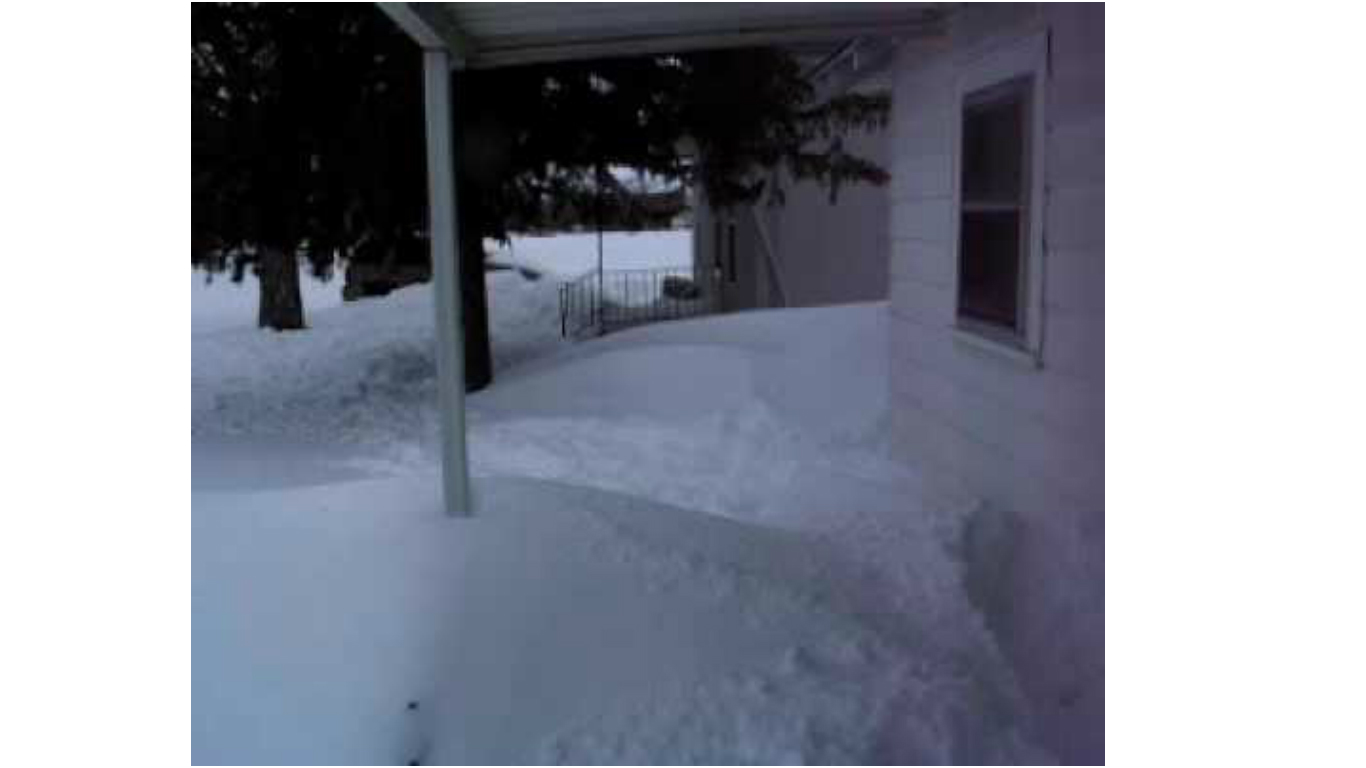
Kansas: Pratt
> County population: 9,582
> 1-day record: 2 feet, 6 inches on Mar 28, 2009
> Station reporting: Preston
> Station elevation: 573 feet
Of weather stations representing the 105 counties in Kansas, no single-day extreme snowfall record surpasses that registered by the Preston weather station in Pratt County relatively recently. Two and a half feet of snow fell in a 24 hour period in the county on March 28, 2009 — one of the more recent one-day records nationwide.
[in-text-ad]
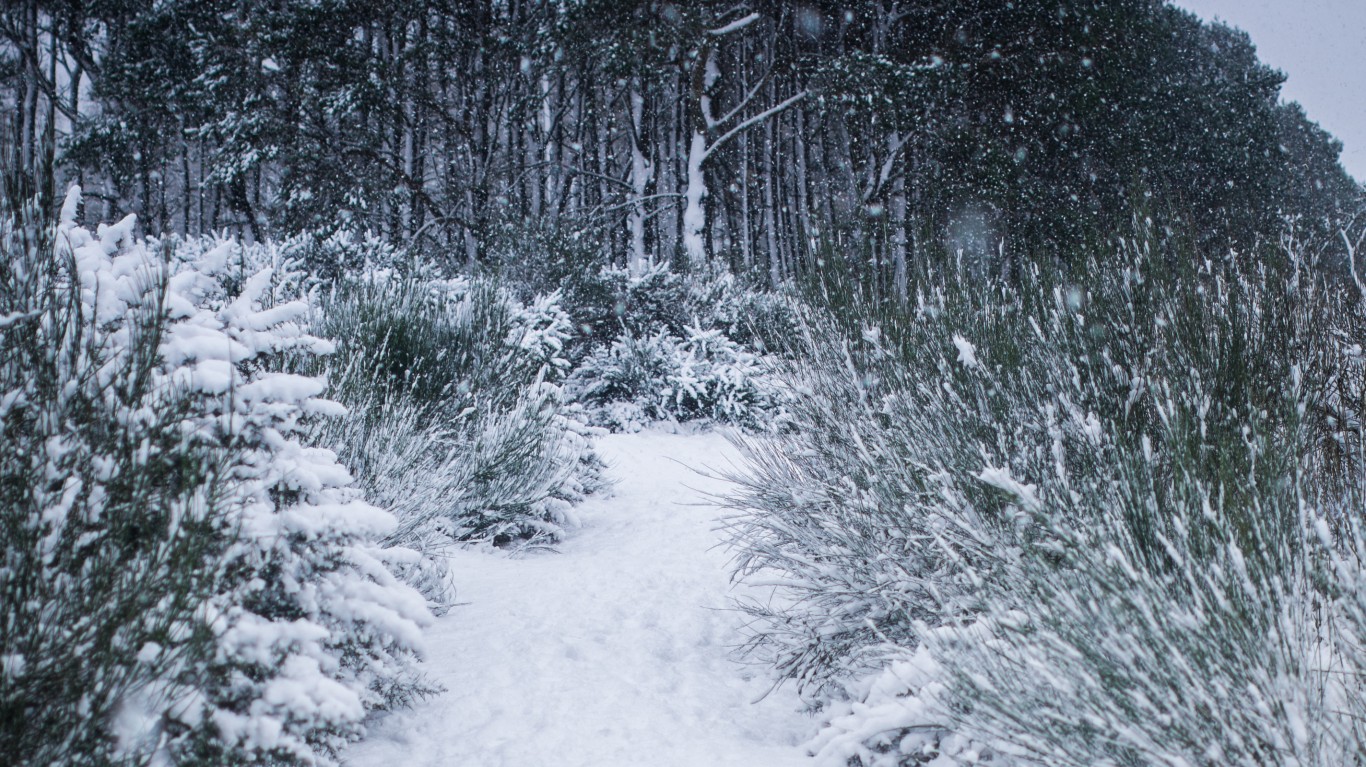
Kentucky: Pike
> County population: 60,483
> 1-day record: 2 feet, 2 inches on Mar 3, 1942
> Station reporting: Simers
> Station elevation: 396 feet
As is generally true for weather stations anywhere with the largest one-day snowfall records, Simers’ elevation of 396 feet above sea-level is on the higher end of elevations across U.S. counties. It is the third highest station in the state. Perhaps due in part to elevation differences, the record snowfall was not as severe in nearby towns as it was at the weather station. The storm was not widely reported by local news in March 1942.
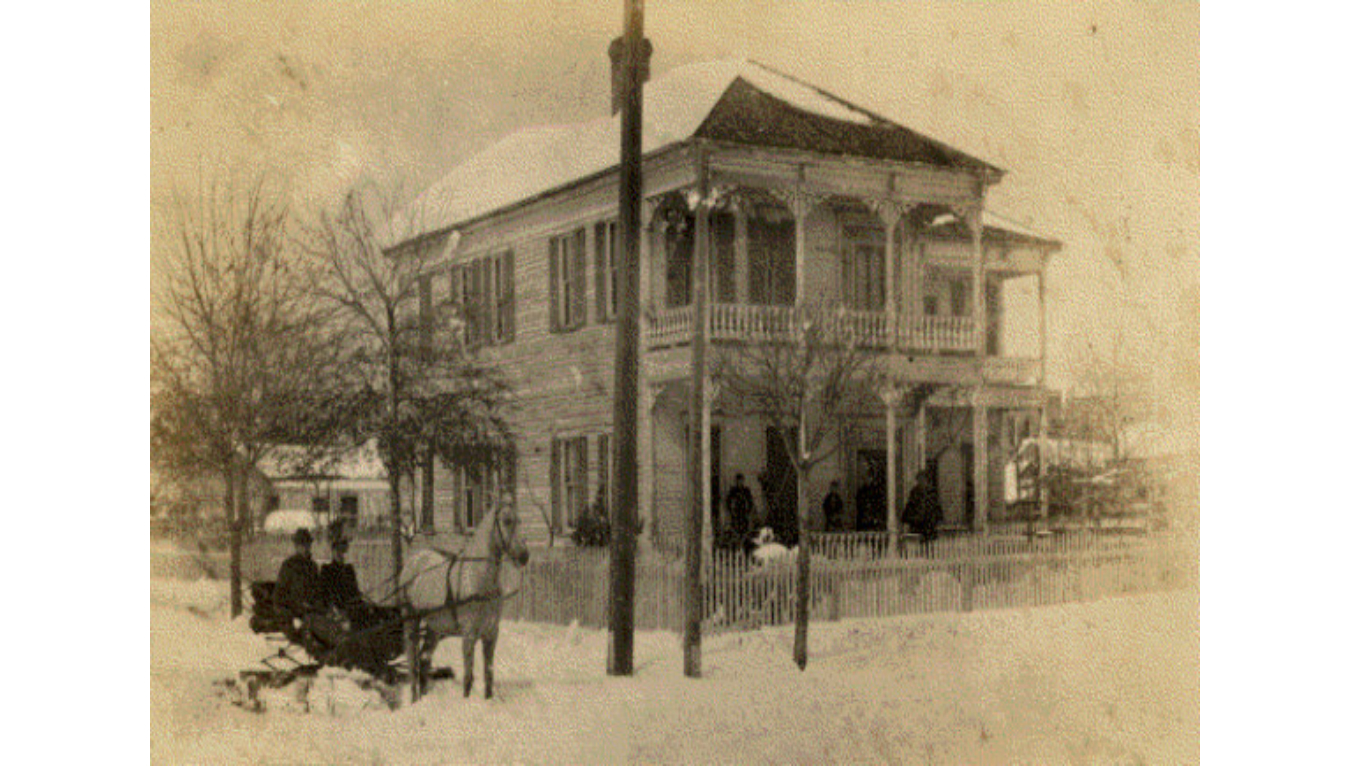
Louisiana: Terrebonne and Vermilion
> County population: 112,587
> 1-day record: 1 foot, 4 inches on Feb 15, 1895 and Feb 14, 1895
> Station reporting: Houma and Shell Beach
> Station elevation: 2 feet and 6 feet
The Valentine’s Day blizzard of 1895 dropped now historic snowfall across Louisiana and the region, setting the record for the state at each Terrebonne and Vermilion counties’ weather stations. Snowfall greater than 1 inch over the course of an entire winter is highly unusual in Louisiana.
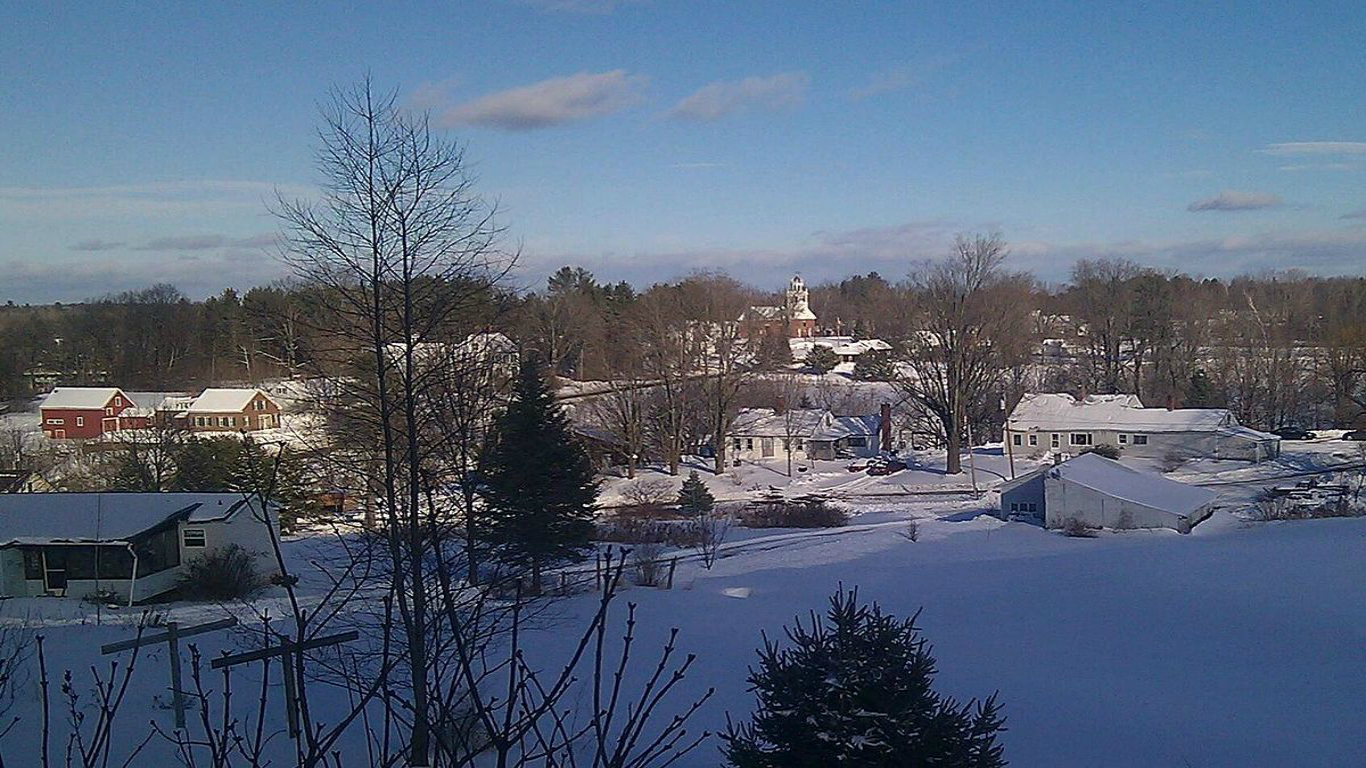
Maine: Franklin
> County population: 30,019
> 1-day record: 3 feet, 5.8 inches on Dec 22, 2008
> Station reporting: Eustis
> Station elevation: 384 feet
Maine’s one-day snowfall record was set on Dec. 22, 2008 at Eustis, the weather station in Franklin County. The nearly 3 and a half feet of snow that fell that day rank first out of single-day records at weather stations in the state’s 16 counties. It ranks eighth compared with extreme snowfall days logged at weather stations across the Northeast, trailing five New York counties and one county in each New Hampshire and Vermont.
[in-text-ad-2]
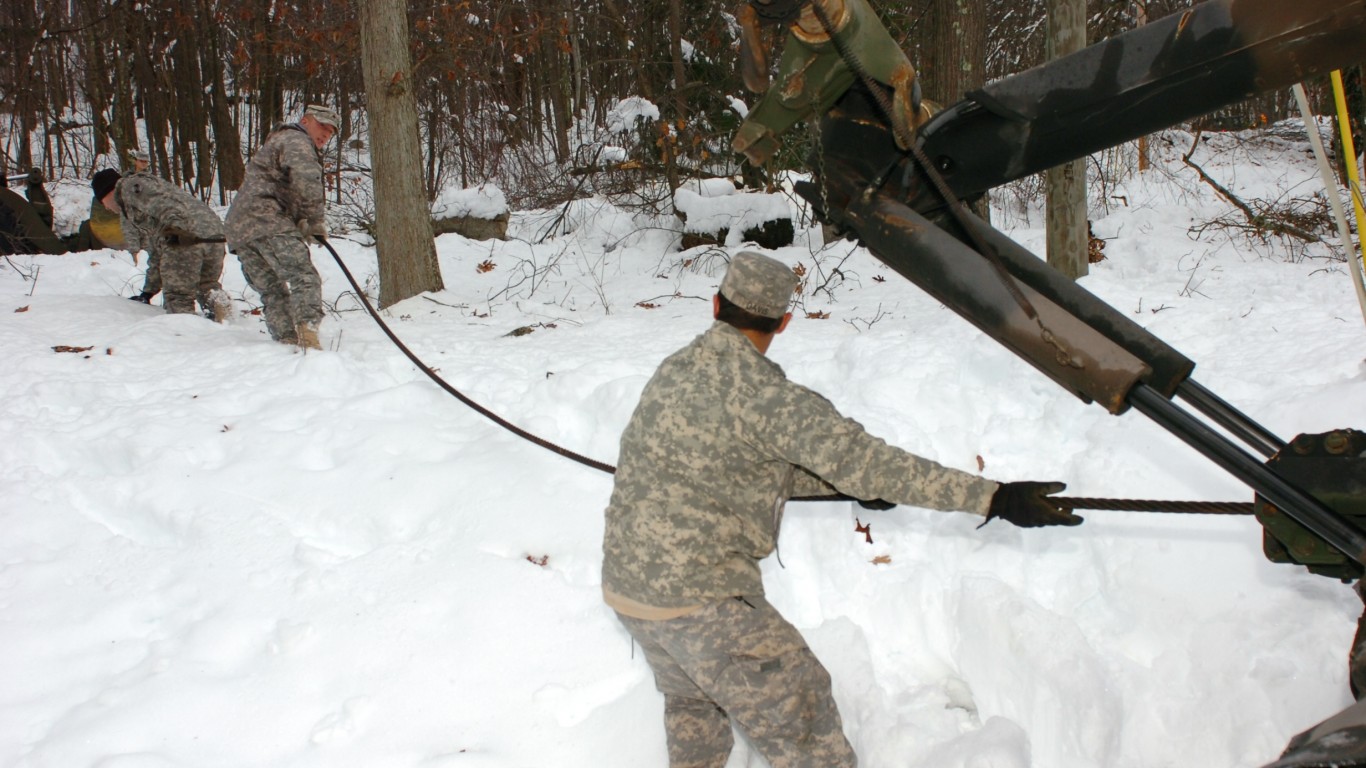
Maryland: Garrett
> County population: 29,376
> 1-day record: 2 feet, 11.5 inches on Feb 6, 2010
> Station reporting: Friendsville
> Station elevation: 696 feet
The storm remembered as snowmageddon brought the record-breaking nearly 3 feet of snow to Garrett County, just outside the Washington D.C. metro area. Nine of the state’s 24 counties recorded their largest snowfall on record during the 2010 storm, and the top four overall records were set during that storm as well. The total snowfall recorded at nearby Dulles Airport (DCA) was at the time the fourth greatest two-day snowfall in Washington D.C. since records began in 1871.

Massachusetts: Worcester
> County population: 822,280
> 1-day record: 2 feet, 7.9 inches on Jan 27, 2015
> Station reporting: Worcester Regional Airport
> Station elevation: 305 feet
The 2 feet, 7.8 inches of snow that fell at Worcester Regional Airport in January 2015 remains the largest snowfall in Massachusetts’ history, trailed by two records in Essex and Norfolk counties in February 1978.
[in-text-ad]
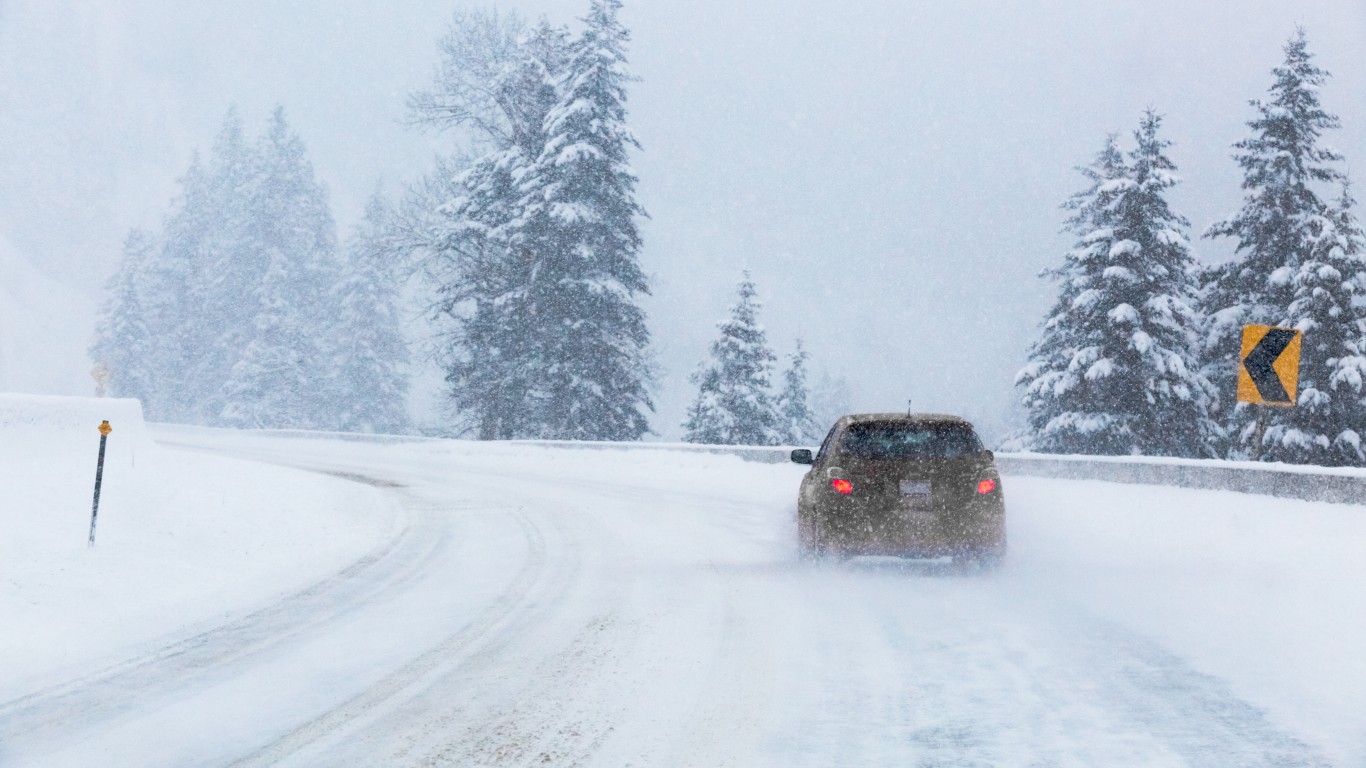
Michigan: Baraga
> County population: 8,507
> 1-day record: 2 feet, 8 inches on Dec 2, 1985
> Station reporting: Herman
> Station elevation: 523 feet
The 32 inch record set in Baraga County in December 1985 remains a relatively dominant largest single-day snowfall in Michigan’s history, leading Mason County’s 27 inch record set December 1962 as well as 82 other counties.
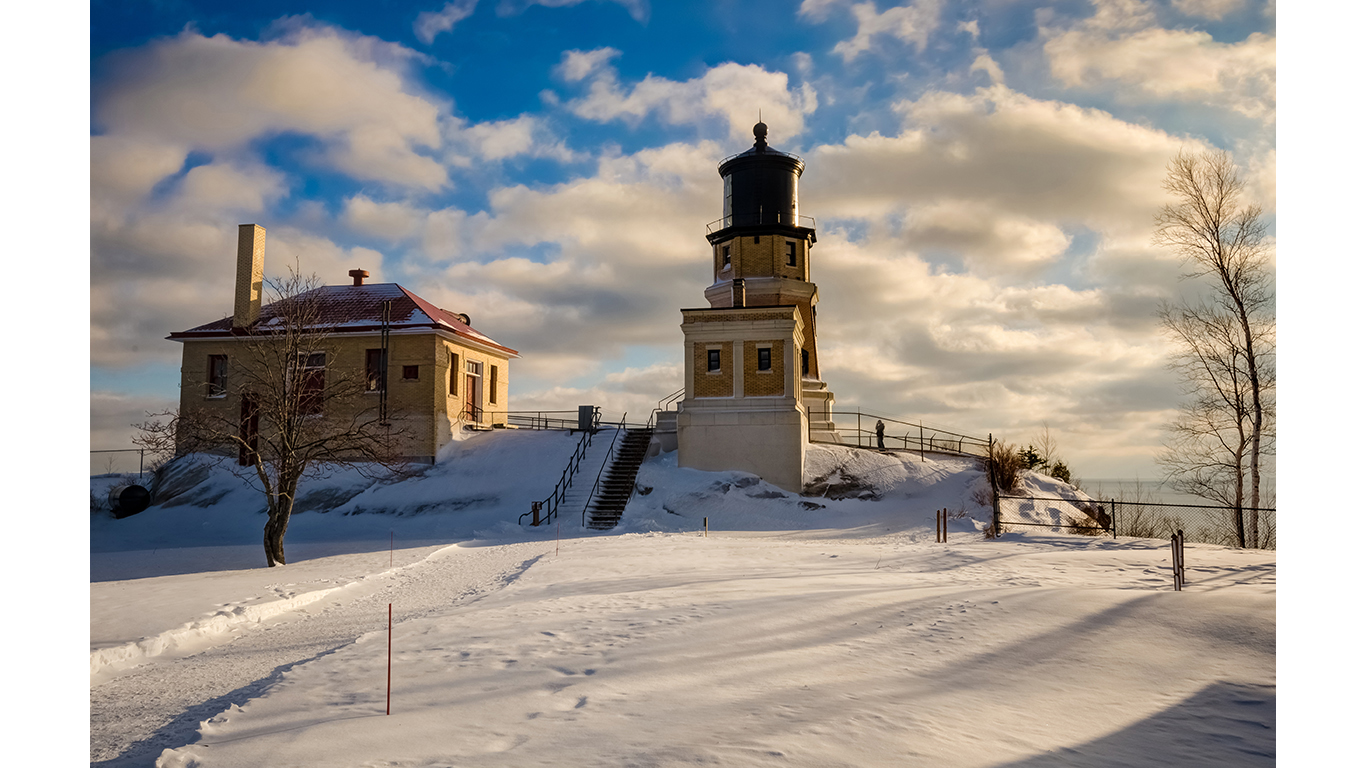
Minnesota: Lake
> County population: 10,569
> 1-day record: 3 feet on Jan 7, 1994
> Station reporting: Wolf Ridge
> Station elevation: 427 feet
The one-day record for snowfall has reached the 3 foot mark in relatively few places in the U.S. Only 130 weather stations out of 3,066 taking data since 1875 have a one-day record of 3 feet or greater. Minnesota’s biggest snowfall at Wolf Ridge ranks in the top 100 one-day extremes across the nation.
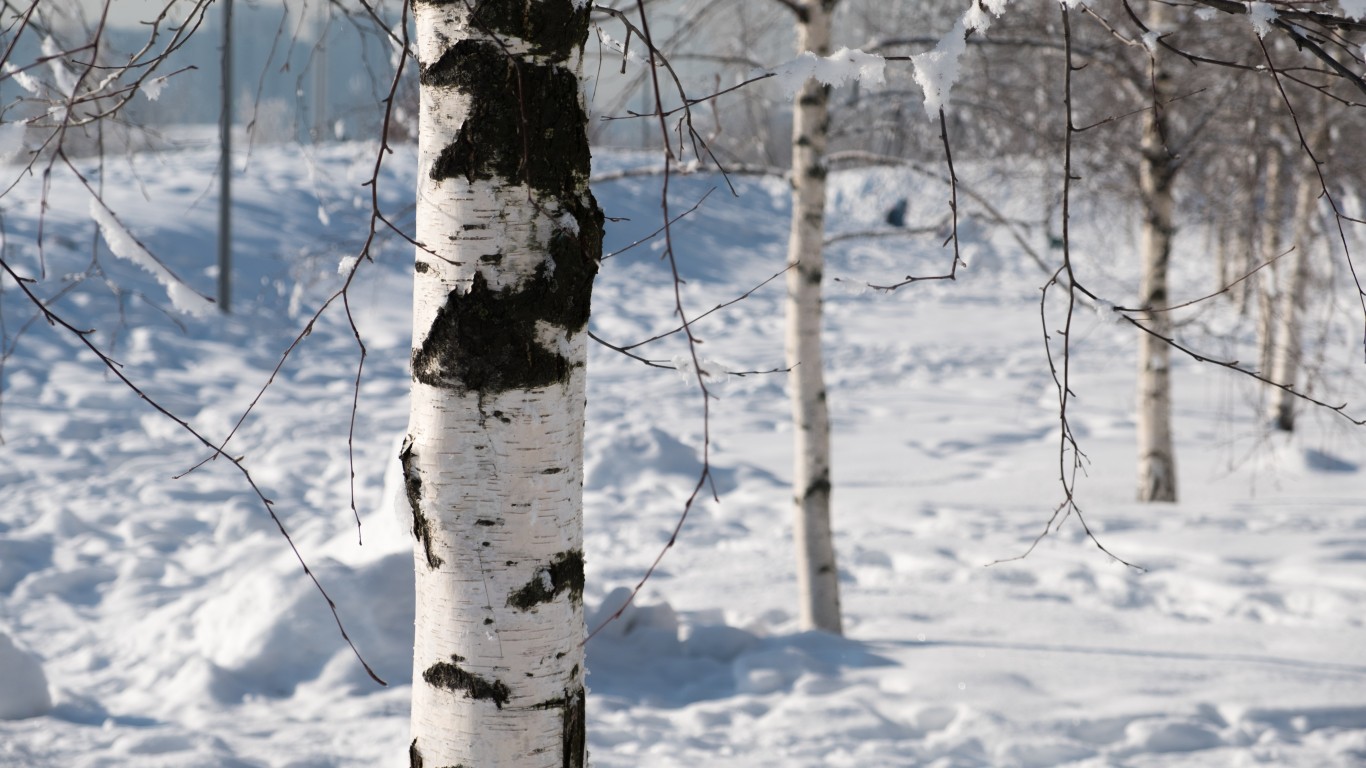
Mississippi: Marshall and Tunica
> County population: 35,787 and 10,170
> 1-day record: 1 foot, 6 inches on Dec 23, 1963
> Station reporting: Mt. Pleasant and Tunica
> Station elevation: 117 feet and 63 feet
Ties between counties in a state’s biggest one-day snowfall are relatively uncommon. It is even more unusual for the two tied records for snowfall to be set on the same day — but this is what happened in Mississippi, where in Marshall and Tunica counties 1.5 feet of snow fell just before Christmas in 1963.
[in-text-ad-2]
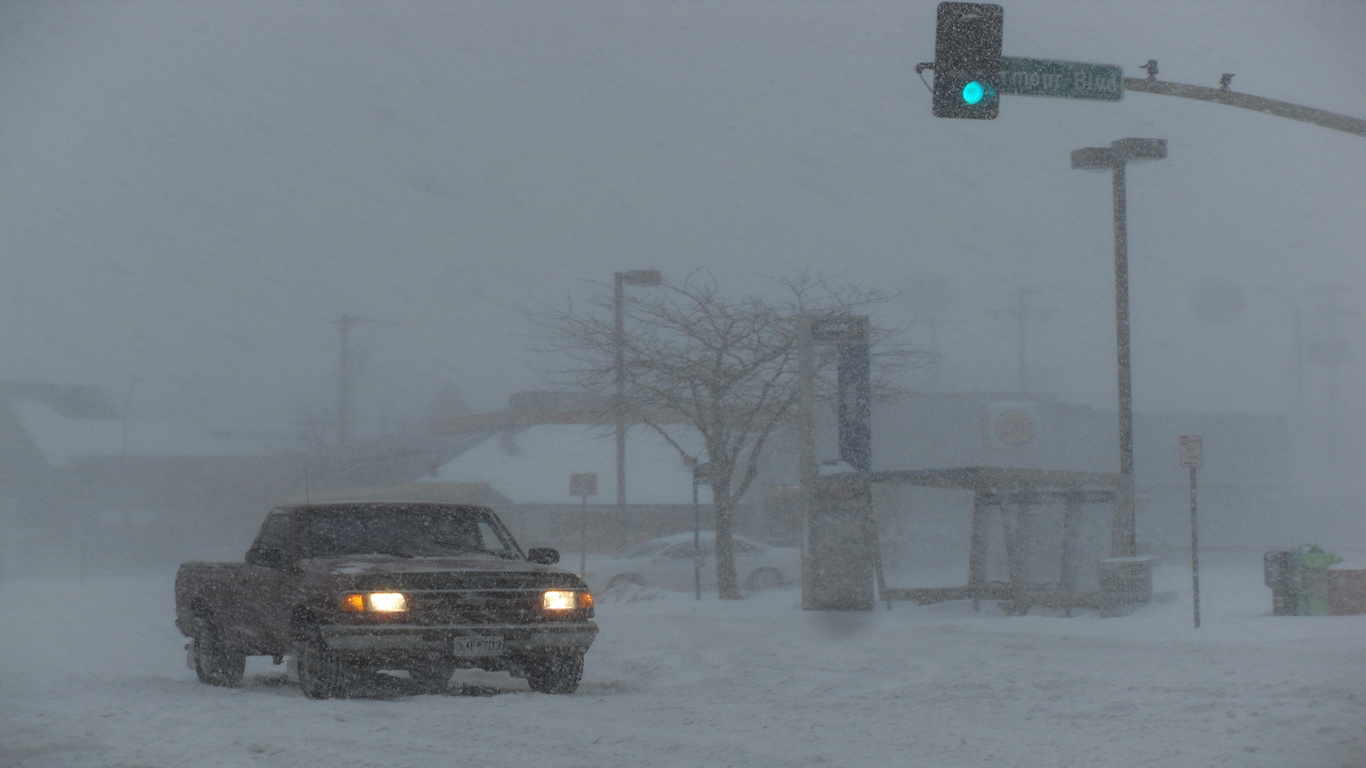
Missouri: Nodaway, Johnson, Bates, Chariton, Cape Girardeau, and Scott
> County population: 16,374
> 1-day record: 2 feet on Feb 25, 1912, Feb 2, 2011 (2), Dec 5, 1925, Feb 25, 1979, and Feb 25, 1979 (2)
> Station reporting: Rich Hill
> Station elevation: 338, 263, 234, 202, 134, and 102 feet
Six Missouri weather stations are tied for the biggest snowfall recorded in less than 24 hours — stations in Nodaway, Johnson, Bates, Chariton, Cape Girardeau, and Scott counties. The even 2-foot record was set in Nodaway on Feb. 25, 1912, in Johnson and Bates on Feb. 2, 2011, in Chariton on Dec. 5, 1925, in Cape Girardeau and in Scott on Feb. 25, 1979.
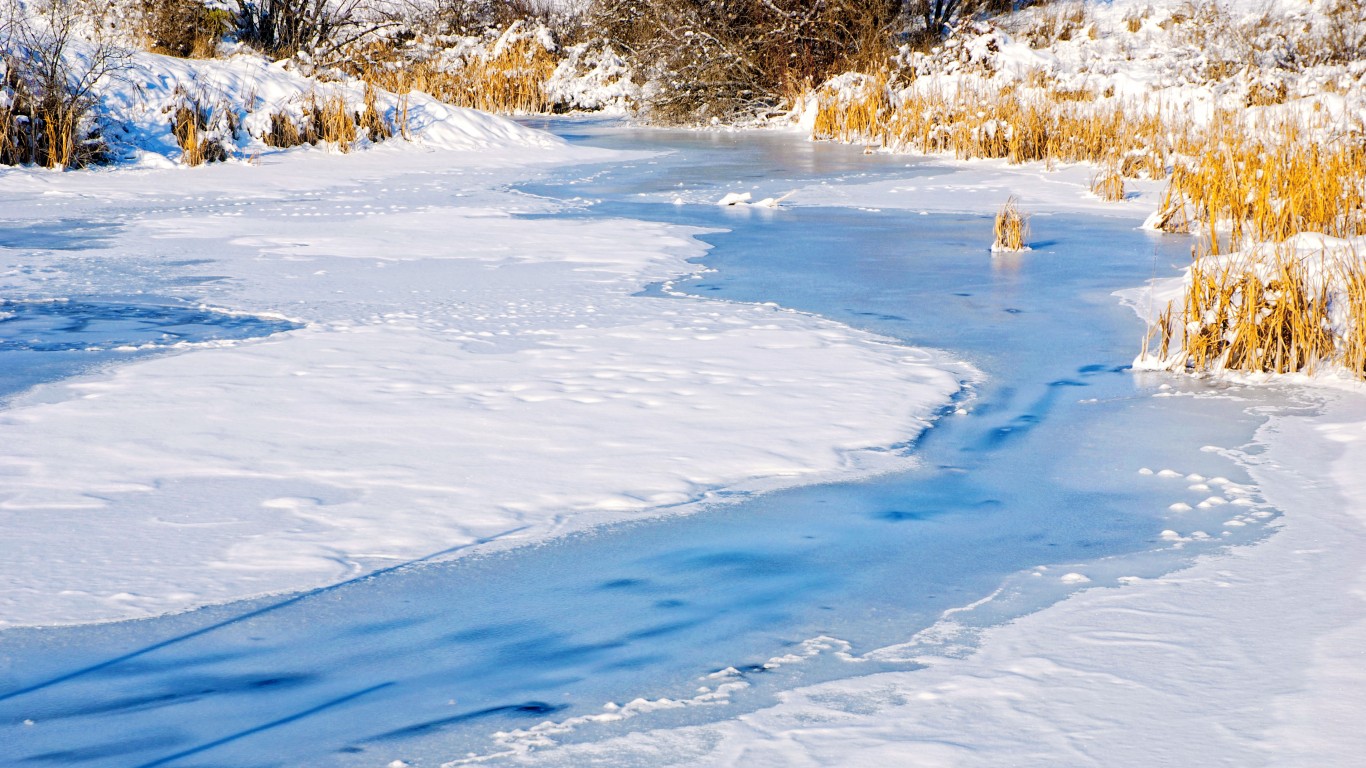
Montana: Meagher and Chouteau
> County population: 1968 and 5,635
> 1-day record: 4 feet on Dec 27, 2003 and May 29, 1982
> Station reporting: Millegan and Shonkin
> Station elevation: 1515 and 1,311 feet
Two 4-foot, one-day snowfalls documented in 2003 and 1982 hold the biggest snowfall record in Montana. The 1982 record was unusual for occurring in May and is one of only 24 one-day extremes nationwide set that month of the year. It is one of only two May records on this list.
[in-text-ad]
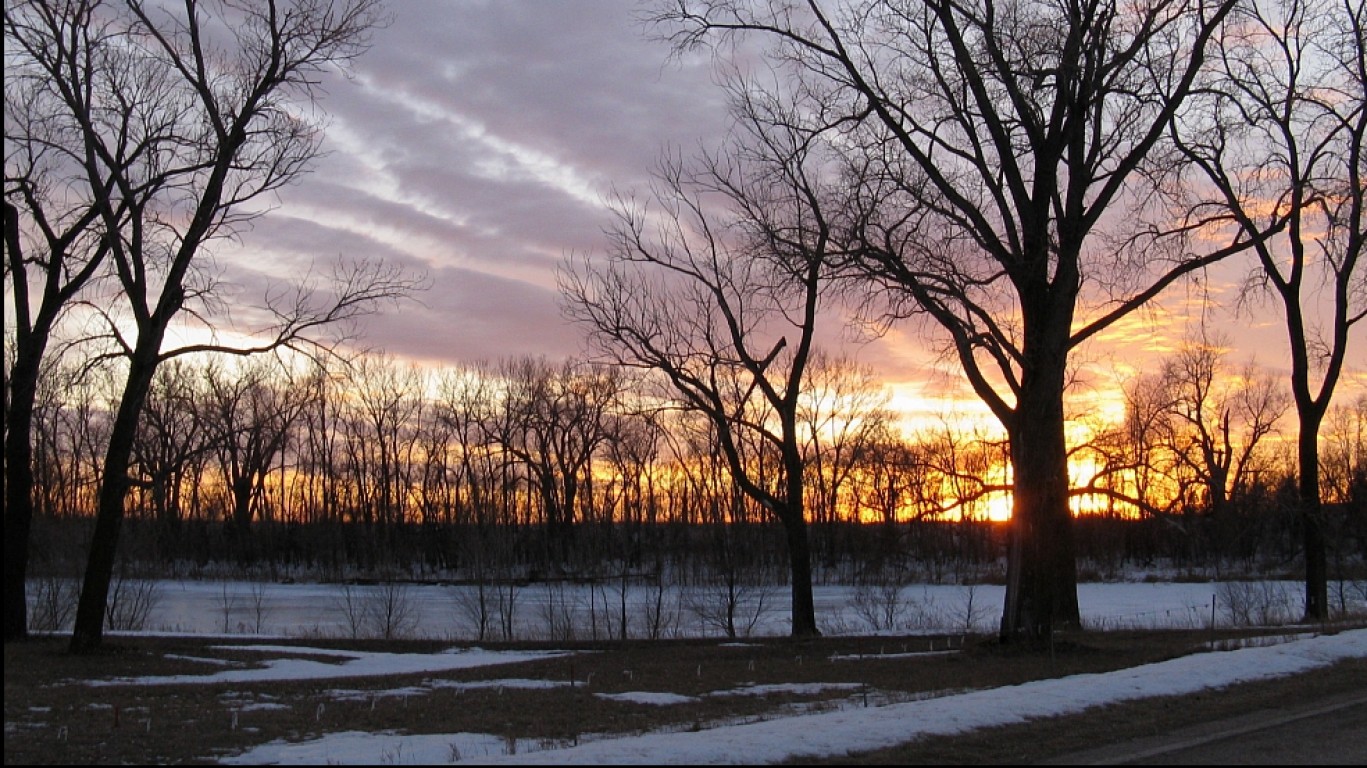
Nebraska: Banner and Sioux
> County population: 696 and 1,266
> 1-day record: 2 feet, 6 inches on Dec 14, 1925 and April 9, 2013
> Station reporting: Harrisburg and Harrison
> Station elevation: 1,387 and 1,125 feet
The two counties tied for having recorded the largest single-day snowfall in Nebraska’s history are also among the least populated places in the country. Banner and Sioux counties have populations of 696 and 1,266 people, respectively.
Reflecting the general pattern of snow records skewing older, Banner’s 2 foot 6 inch record was set in 1925. Sioux County, on the other hand, is one of relatively few weather stations (176) with a one-day record set in the last five years.
Nevada: Douglas
> County population: 47,828
> 1-day record: 3 feet, 9 inches on Apr 4, 1958
> Station reporting: Glenbrook
> Station elevation: 1,936 feet
A state’s biggest single-day snowfall is not usually among the most remarkable snowfalls nationwide — but Nevada’s is. An even 45 inches, just over 3.5 feet, fell on the Glenbrook weather station in Douglas County on April 4, 1958. The previous record, and now second-largest single-day snowfall in Nevada, occurred 20 years earlier, in Washoe County on Feb. 11, 1938.
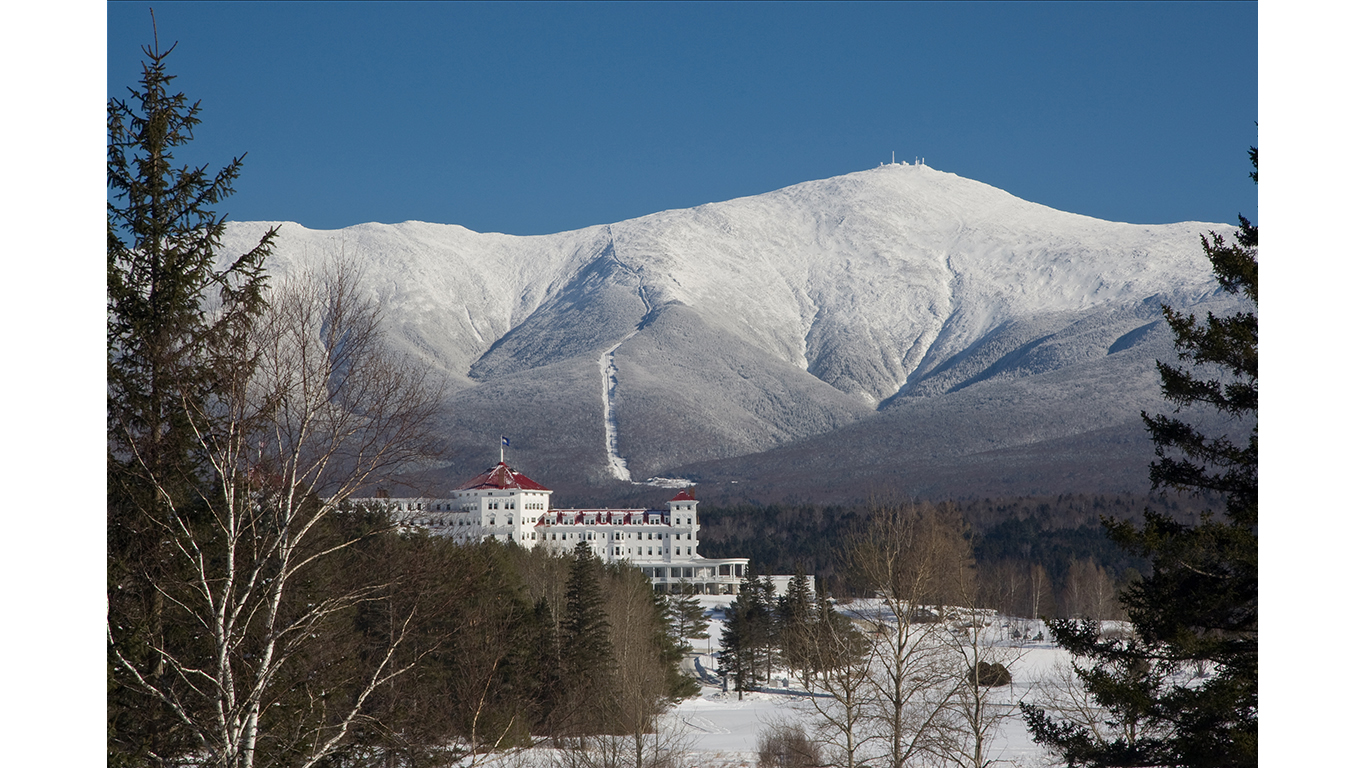
New Hampshire: Coos
> County population: 32,038
> 1-day record: 4 feet, 1.3 inches on Feb 25, 1969
> Station reporting: Mt. Washington
> Station elevation: 1,910 feet
The top three single-day snowfall records in New Hampshire’s history were set before 2000. The top record — 4 feet 1.3 inches registered at Mt. Washington at the end of February 1969 — ranks as the 18th largest single-day snowfall ever recorded in the United States. It trails Oneida, New York’s single-day record for the largest in the Northeast.
[in-text-ad-2]
New Jersey: Somerset and Sussex
> County population: 330,176 and 142,298
> 1-day record: 2 feet, 6 inches on Jan 23, 2016 and Jan 26, 1905
> Station reporting: Bernards Township and Sussex
> Station elevation: 69 feet
Very few snowfall records tied for the state’s record are separated further in time than those in New Jersey, where the two historic one-day snowfalls were recorded more than a century apart. Two feet, 6 inches fell in less than 24 hours in Somerset and Sussex counties in 2016 and 1905.
New Mexico: Socorro
> County population: 17,000
> 1-day record: 3 feet, 5 inches on Feb 3, 1964
> Station reporting: Kelly
> Station elevation: 2,042 feet
Dona Ana is the one county in the state with no weather data. Of the records set at weather stations in New Mexico’s 32 remaining counties, only the snowfall level registered at Kelly RCH weather station surpassed 3 feet. The day stands at 56th among records taken at the country’s more than 3,000 weather stations.
[in-text-ad]
New York: Oneida
> County population: 230,782
> 1-day record: 4 feet, 2 inches on Feb 1, 1966
> Station reporting: Camden
> Station elevation: 177 feet
The 4 feet, 2 inches of snow that fell at Camden on Feb. 1, 1966 holds the record for Oneida County as well as New York and ranks in the top 20 biggest single-day snowfalls anywhere nationwide. The historic day occurred at the tail end of the Blizzard of 1966, which set snow records across the region.
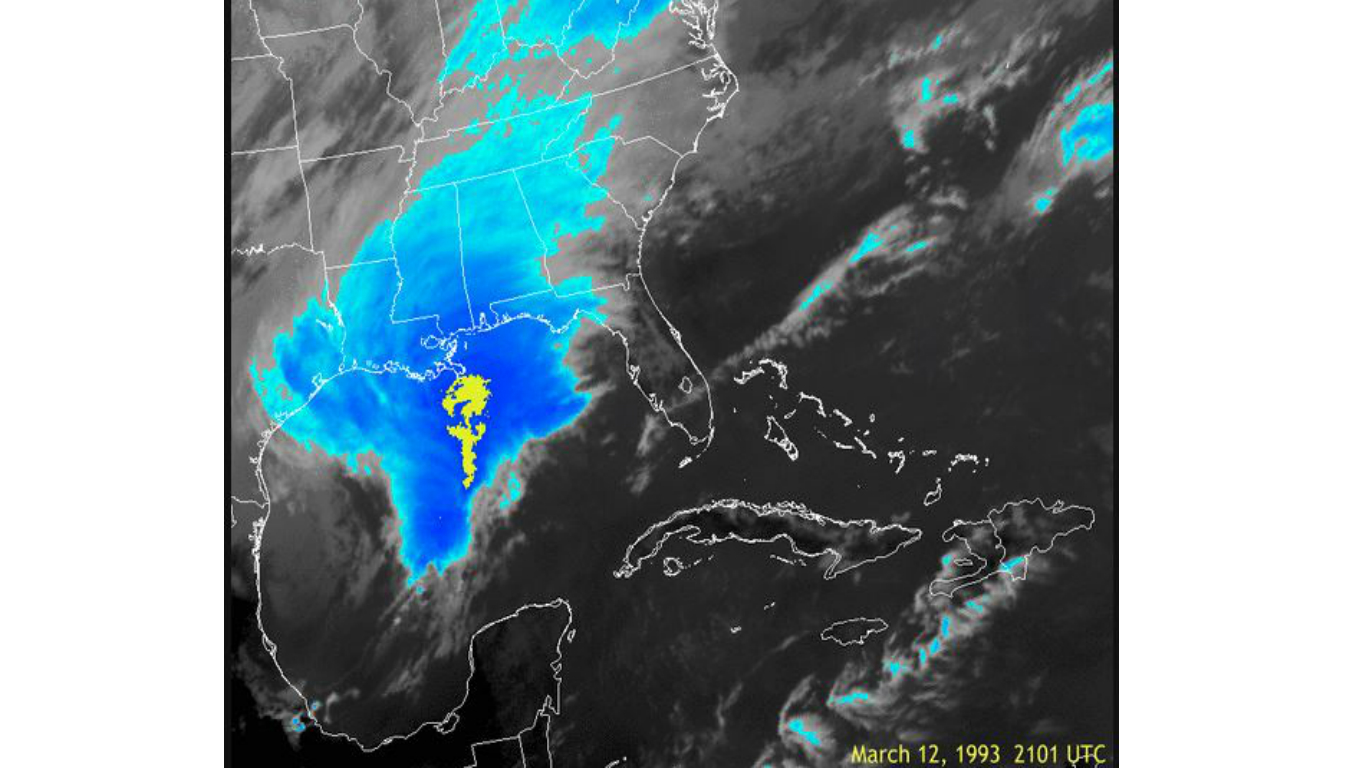
North Carolina: Yancey
> County population: 17,667
> 1-day record: 3 feet on Mar 13, 1993
> Station reporting: Mt. Mitchell
> Station elevation: 1,902 feet
It is unusual within the entire history of snowy winters for a state’s biggest day of snowfall to be as dominant of a record as North Carolina’s. The 3 feet of snow that fell on March 13, 1993 remains nearly a foot above the next biggest county record of 2 feet 2 inches set in Wayne County in 1927.
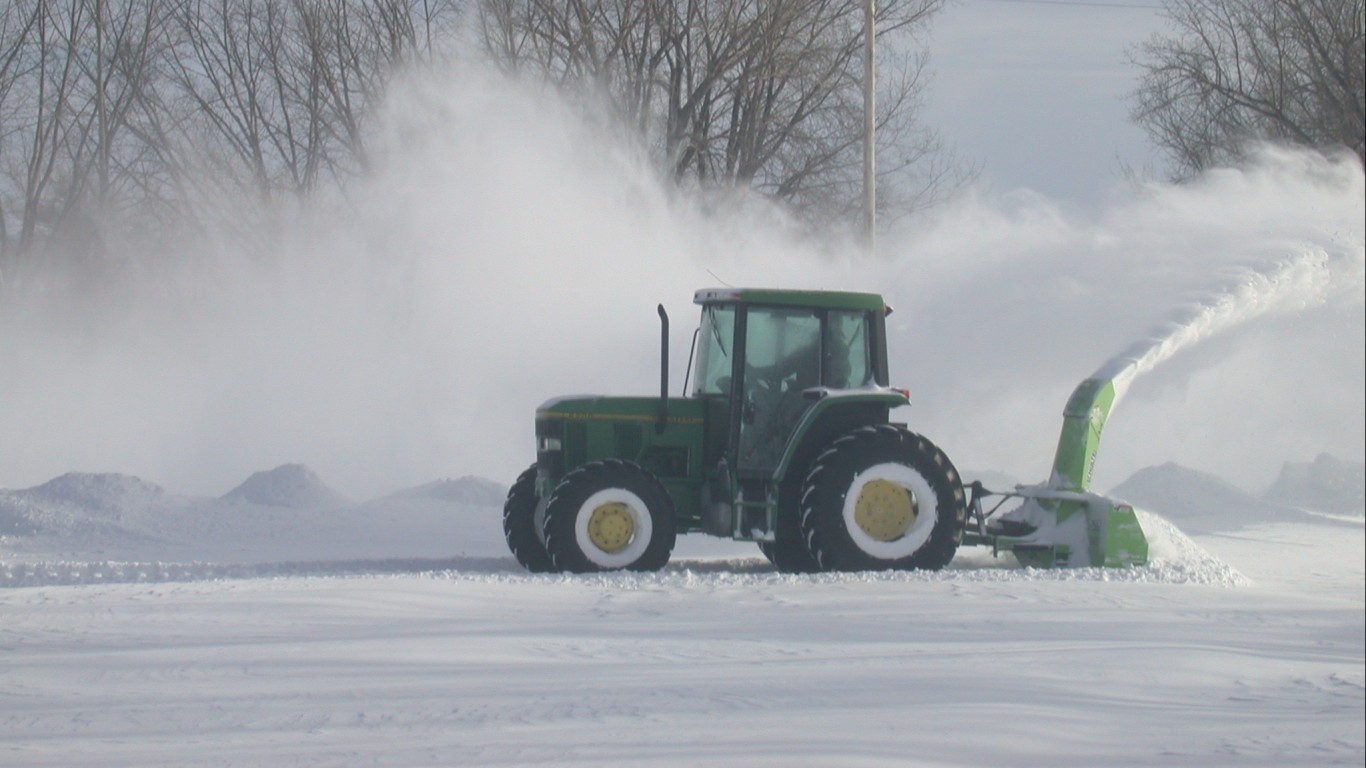
North Dakota: Ward
> County population: 69,034
> 1-day record: 2 feet, 3 inches on Apr 27, 1984
> Station reporting: Minot
> Station elevation: 508 feet
The North Dakota county with the snowiest day on record also happens to have one of the state’s larger populations. Nearly 10% of the state population lives in Ward, where on April 27, 1984, just over 2 feet of snow fell at the Minot weather station in less than 24 hours.
[in-text-ad-2]
Ohio: Trumbull
> County population: 201,794
> 1-day record: 2 feet, 6 inches on Apr 20, 1901
> Station reporting: Warren
> Station elevation: 274 feet
The 3.5 feet of snow that set the record for Ohio’s snowiest day stands nearly a half foot above the second largest record, which was set at Gratiot weather station in Licking county on the same day, April 20, 1901. The blizzard that brought the snow, known as the Great Snowstorm of 1901, was at that time unprecedented for the region so late in the winter season.
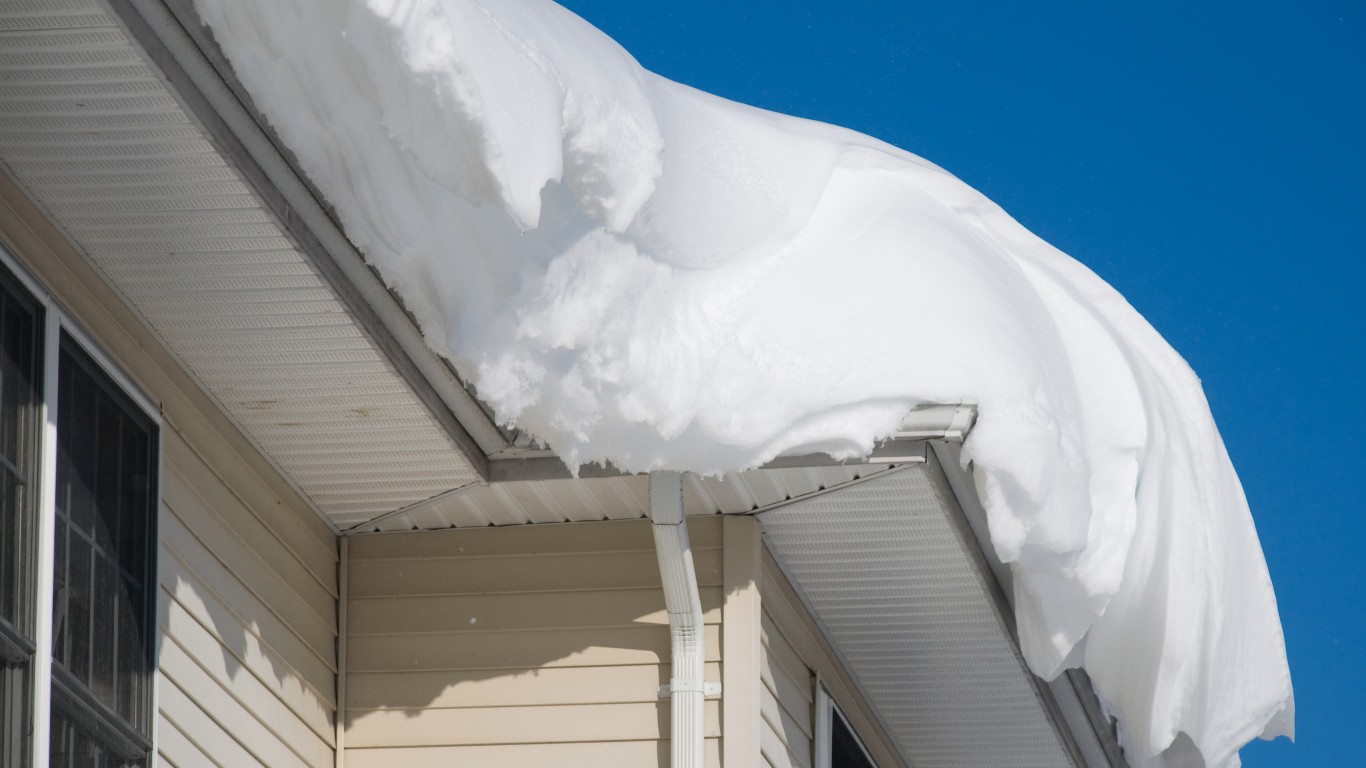
Oklahoma: Woods and Woodward
> County population: 9,127 and 20,967
> 1-day record: 2 feet, 2 inches on Mar 28, 2009
> Station reporting: Freedom and Woodward
> Station elevation: 462 feet and 579 feet
Although county snowfall records were often the result of major regional snowstorms, snowfall levels during the storms fluctuated enough that relatively few stations — even in nearby counties — registered the same amount of snow on the same day. But this was the case in Oklahoma — 26 inches or just over 2 feet of snow fell on March 28, 2009, setting the record in both Woods and Woodward counties.
[in-text-ad]
Oregon: Malheur
> County population: 30,431
> 1-day record: 5 feet on Apr 8, 2009
> Station reporting: Riverside
> Station elevation: 1,030 feet
The record in Oregon for largest single day snowfall — a stunning 5 feet in less than 24 hours — is far and away the biggest in the state. All the more remarkable for occurring so late in the winter season, it is the ninth snowiest day of any place in U.S. history. The next largest county record is 3 feet 11 inches in Hood River County in 1980.
Pennsylvania: Wayne
> County population: 51,536
> 1-day record: 3 feet, 5 inches on Feb 16, 1958
> Station reporting: Lakeville
> Station elevation: 439 feet
Pennsylvania’s 1958 snow record set at Lakeville in Wayne County remains the state’s biggest single day of snowfall. The record ranks 56th in the nation out of over 3,000 county-level snow records and is the ninth biggest snowfall out of the over 200 stations across the Northeast.
Rhode Island: Providence
> County population: 634,533
> 1-day record: 2 feet, 6 inches on Feb 7, 1978
> Station reporting: Woonsocket
> Station elevation: 34 feet
The Northeast Blizzard of 1978 that set Rhode Island’s snowiest day record of 2.5 feet on Feb. 7 also set records in three other counties in the state. The blizzard dumped the maximum amount of snow recorded at 11 other weather stations in the nation that still hold to this day.
[in-text-ad-2]
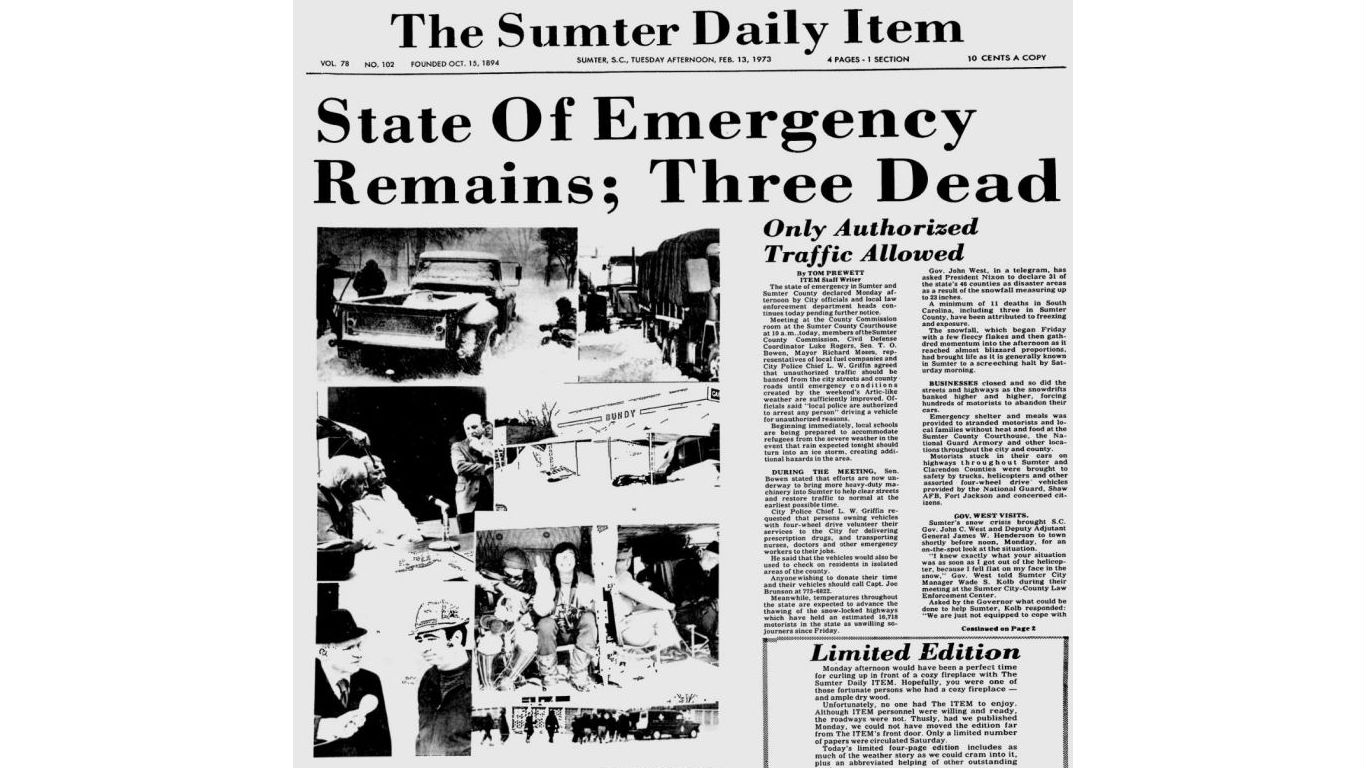
South Carolina: Sumter
> County population: 106,995
> 1-day record: 1 foot, 9 inches on Feb 9, 1973
> Station reporting: Tilghman Forest Nursery
> Station elevation: 64 feet
Nearly 2 feet of snow fell in less than 24 hours at Tilghman Forest Nursery weather station in February 1973, setting the record for Sumter county and South Carolina. The next two largest records in the state were also set in February that year. Because of the uncharacteristically severe winter weather, the 1973 blizzard was reported as one of the worst ever seen in South Carolina. The blizzard led to widespread power outages and business shutdowns across the state.
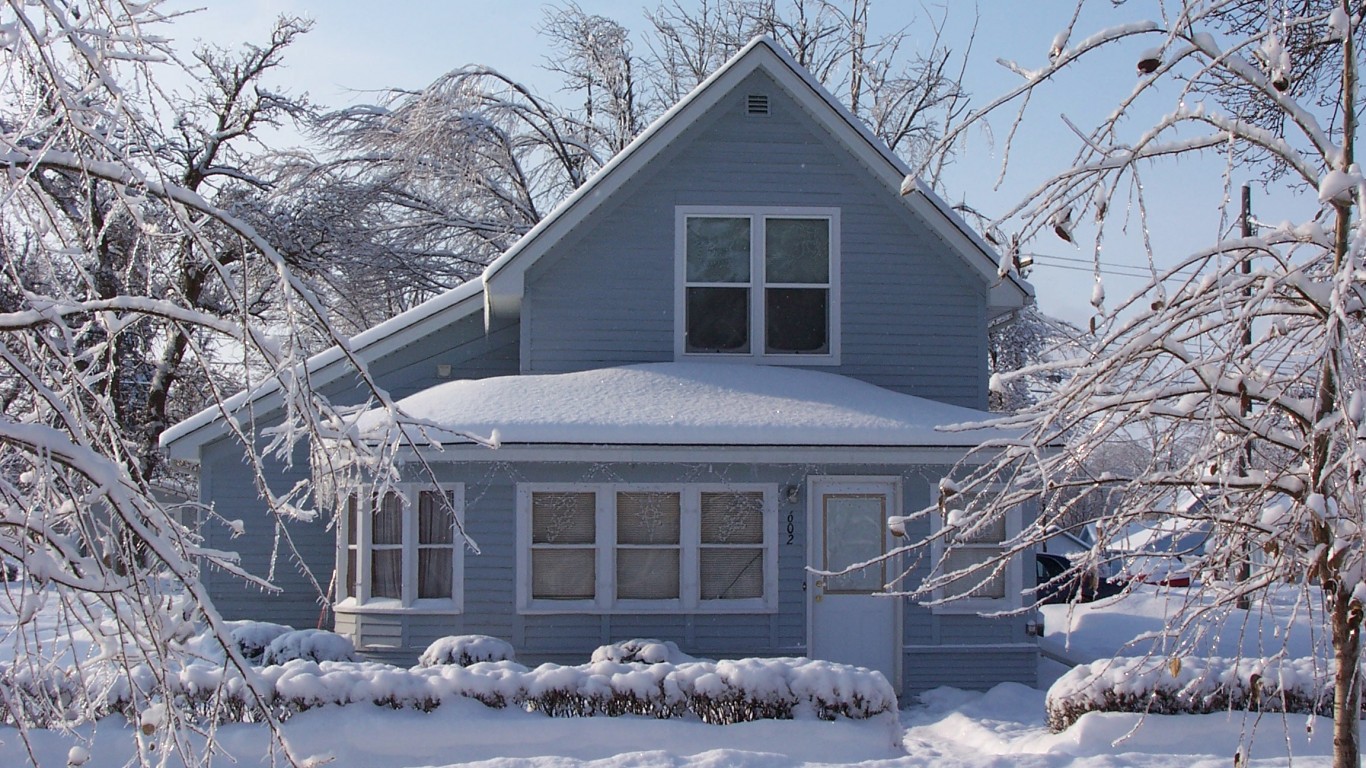
South Dakota: Lawrence
> County population: 25,234
> 1-day record: 4 feet, 4 inches on Mar 14, 1973
> Station reporting: Lead
> Station elevation: 1,558 feet
Lead County holds the snow record in South Dakota. Over 4 feet of snow fell at the county’s weather station March 14, 1973. Of the 66 South Dakota counties compared for this analysis, only the state’s top two county records rank close to the top in the nation. The record set at Lead (52 inches) and at Longvalley in Jackson County in 1949 are the 15th and 22nd biggest single-day records in the U.S., respectively.
[in-text-ad]
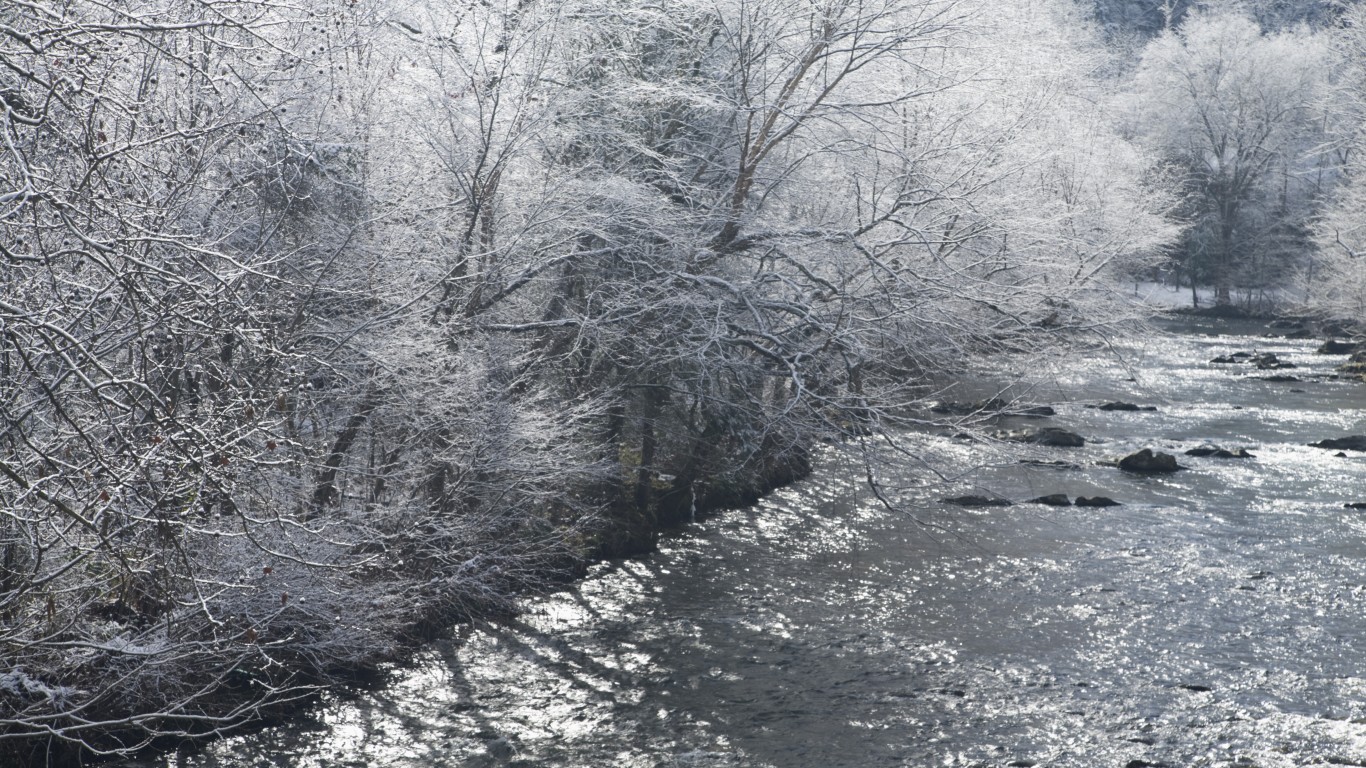
Tennessee: Sevier
> County population: 96,287
> 1-day record: 2 feet, 6 inches on Mar 14, 1993
> Station reporting: Mt. Leconte
> Station elevation: 1,979 feet
The storm that brought 2.5 feet of snow to Sevier County in 1993 broke the record at Mt Leconte’s weather station, as well as local records in eight other counties in the state. Known at the time as the 1993 Superstorm, the historic blizzard set snow records across a large section of the country — from Northern Alabama and Florida to the Appalachian Mountains to New England.
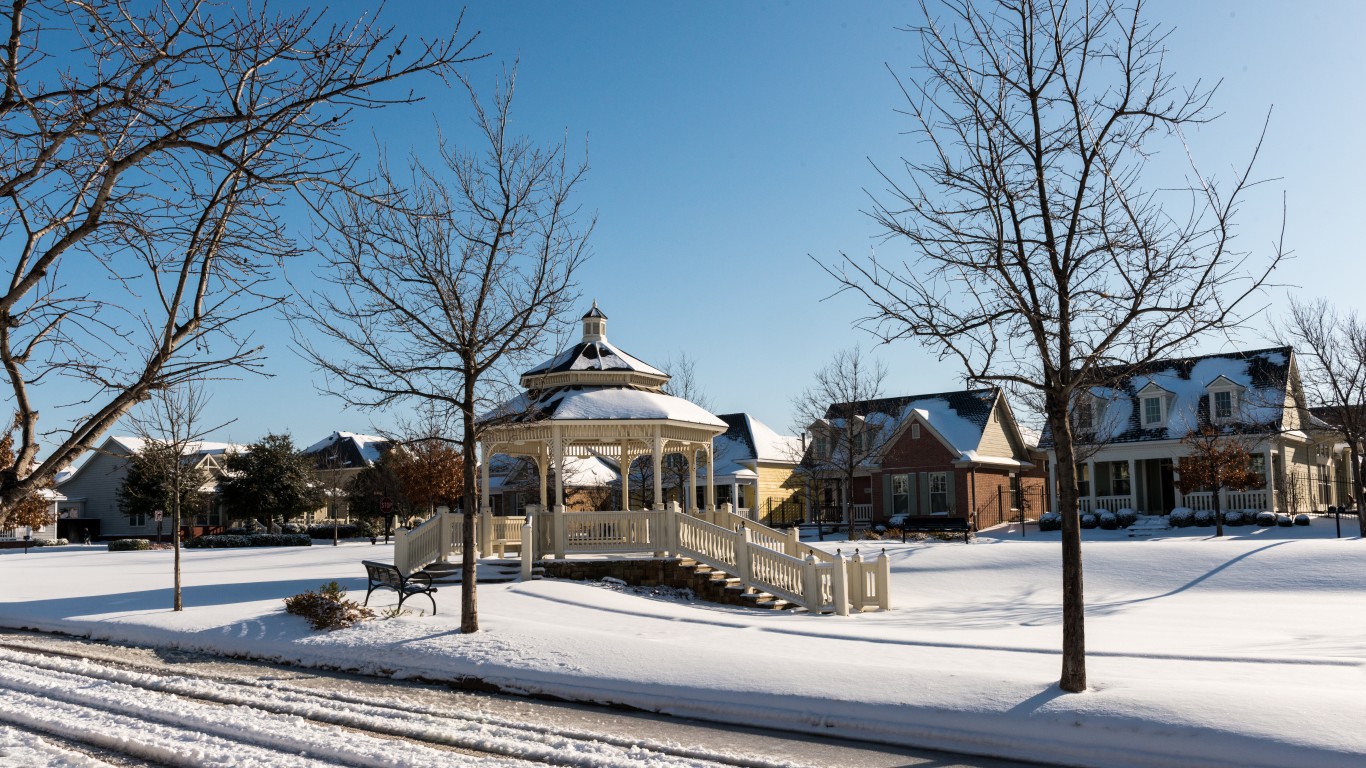
Texas: Lipscomb
> County population: 3,469
> 1-day record: 2 feet, 1 inches on Mar 28, 2009
> Station reporting: Follett
> Station elevation: 844 feet
The vast majority of U.S. snow records are set between December and the end of February, which makes Lipscomb County’s state-leading snow record all the more remarkable. Just over 2 feet fell at the county’s Follet weather station on March 28, 2009. Of the 254 Texas counties considered, less than a dozen have snow records set in March and none nearly as large as Follett’s.
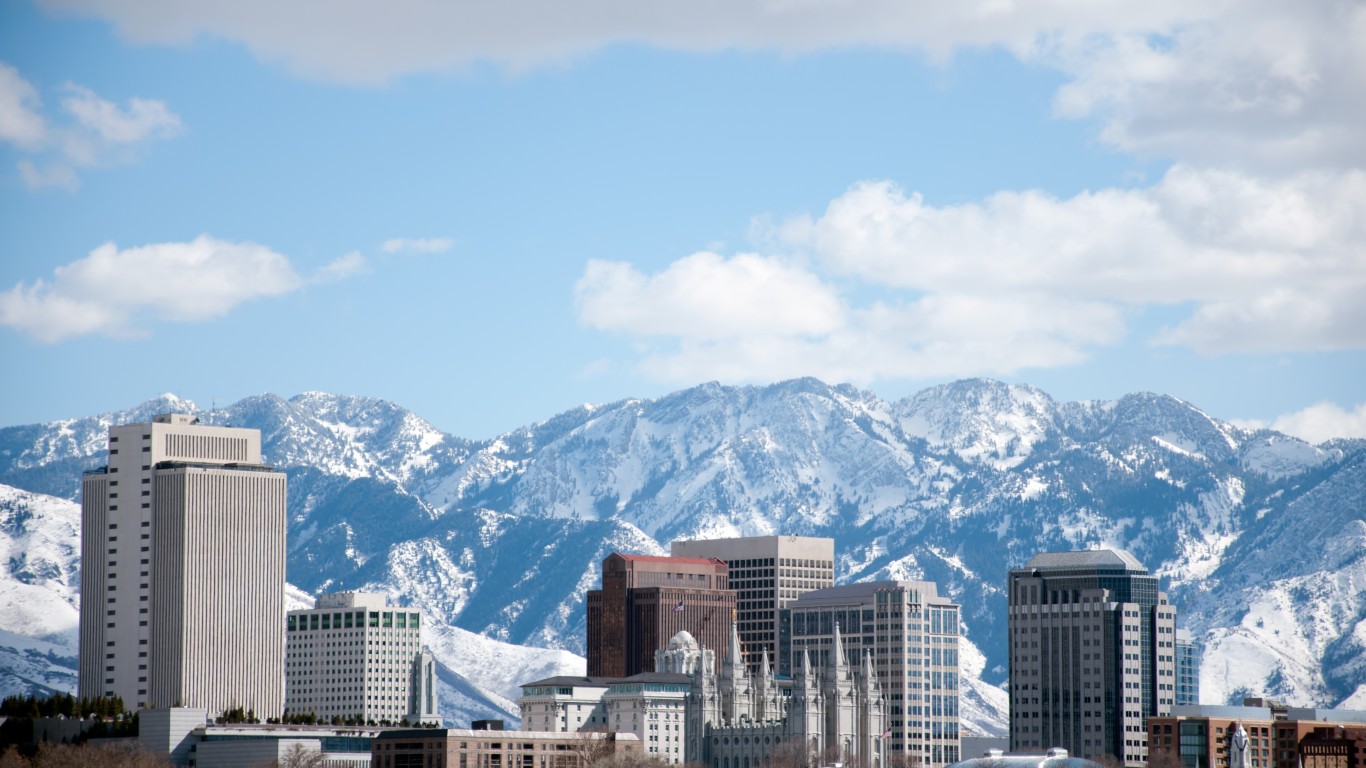
Utah: Salt Lake
> County population: 1,120,805
> 1-day record: 3 feet, 2 inches on Dec 2, 1982
> Station reporting: Alta
> Station elevation: 2,661 feet
Salt Lake County, Utah, reported just over 3 feet of snow in less than 24 hours at the beginning of December in 1982. The weather station, Alta, is one of the higher-elevation stations even for Utah. At 2,661 feet, it is third highest out of the state’s 29 county weather stations reporting snow records.
[in-text-ad-2]
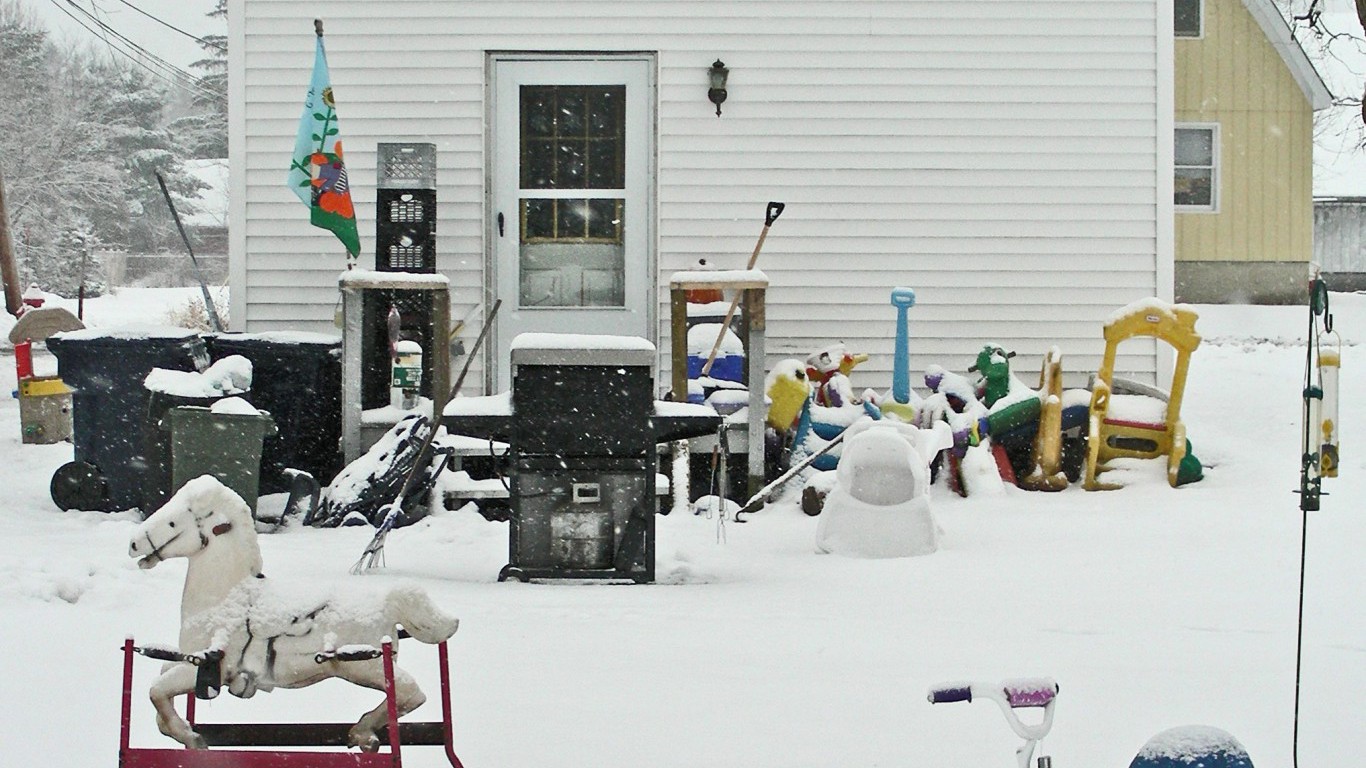
Vermont: Orleans
> County population: 26,911
> 1-day record: 3 feet, 6 inches on Feb 5, 1995
> Station reporting: Jay Peak
> Station elevation: 561 feet
The most snow to fall in a single day in Vermont was 3.5 feet on Feb. 5, 1995 at the Jay Peak weather station in Orleans County. Jay Peak is a ski resort that boasts the most snow in eastern North America. The nor’easter behind the record snowfall was one of several major winter storms during the region’s 1994/1995 winter, which was also characterized by below average temperatures.
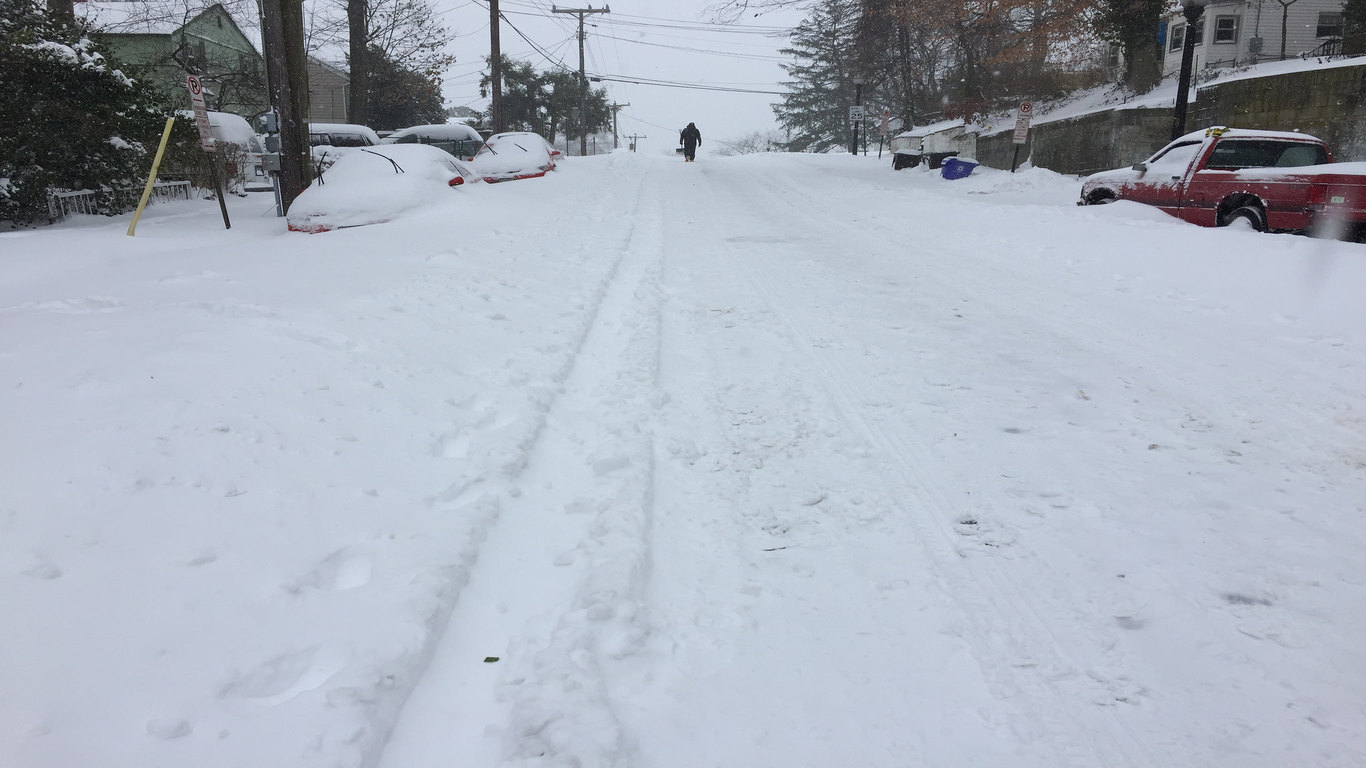
Virginia: Loudoun
> County population: 385,143
> 1-day record: 3 feet, 1 inches on Jan 24, 2016
> Station reporting: Round Hill
> Station elevation: 212 feet
While Virginia’s single-day snowfall of over 3 feet — registered at Round Hill — was set relatively recently, in 2016, other counties’ snow records were set even more recently. The one-day snowfall record in eight other Virginia counties was set in 2017, 2018, and 2019.
[in-text-ad]
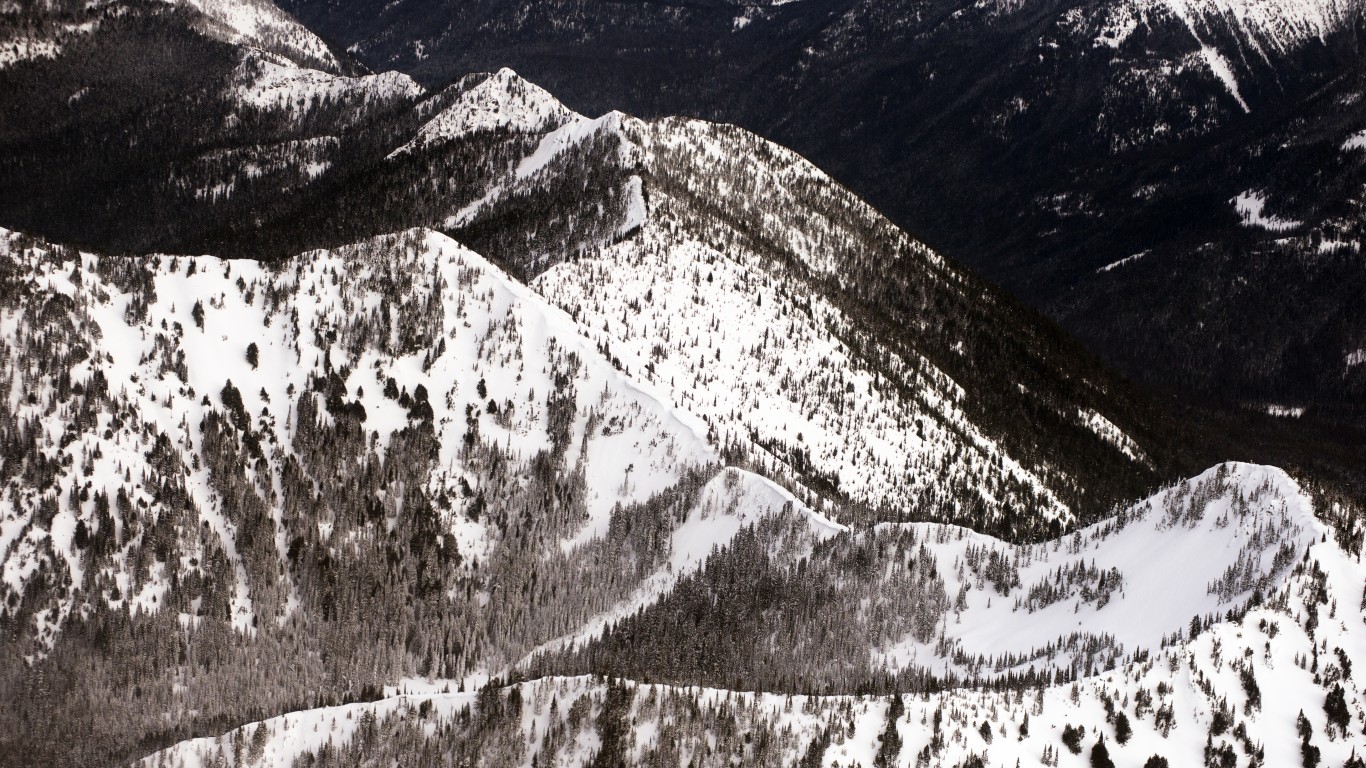
Washington: Pierce
> County population: 859,840
> 1-day record: 5 feet, 10 inches on Nov 26, 1955
> Station reporting: Rainier Paradise
> Station elevation: 1,654 feet
The Rainier Paradise weather station’s pleasant-sounding name may have been up for debate on Nov. 26, 1955 — at least for people who prefer less snow. A whopping almost 6 feet of snow fell at the Pierce County station that day, far and away the record for the state, with Okanogan county’s 4 foot 4 inch snow record trailing in second place. The state’s one-day record is third in the nation after Boulder, Colorado and Yuba, California.
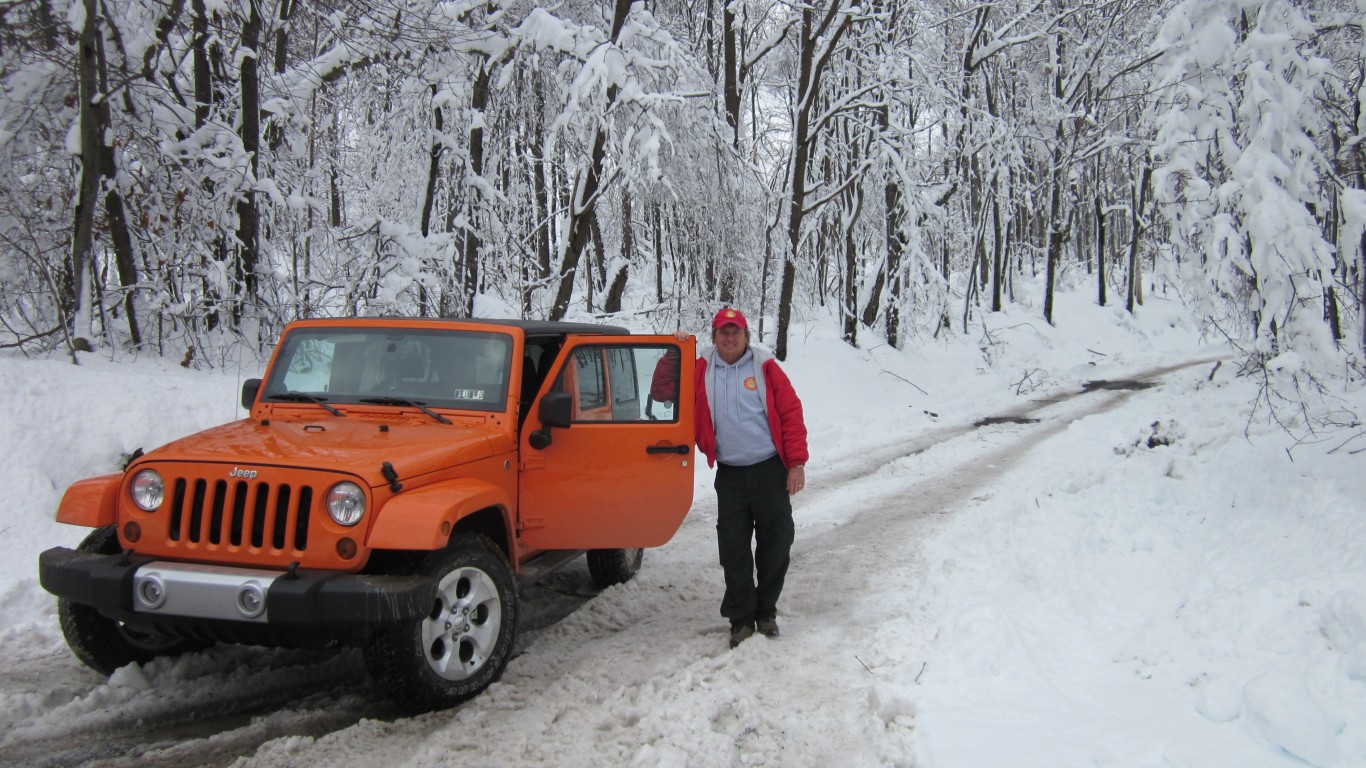
West Virginia: Preston
> County population: 33,837
> 1-day record: 3 feet, 1 inches on Feb 21, 2003
> Station reporting: Coopers Rock
> Station elevation: 695 feet
Only 10 of the 55 county snow records set in West Virginia occurred after the year 2000. One of them, and the biggest, was documented at Preston County’s Coopers Rock weather station. Just over 3 feet fell Feb. 21, 2003.
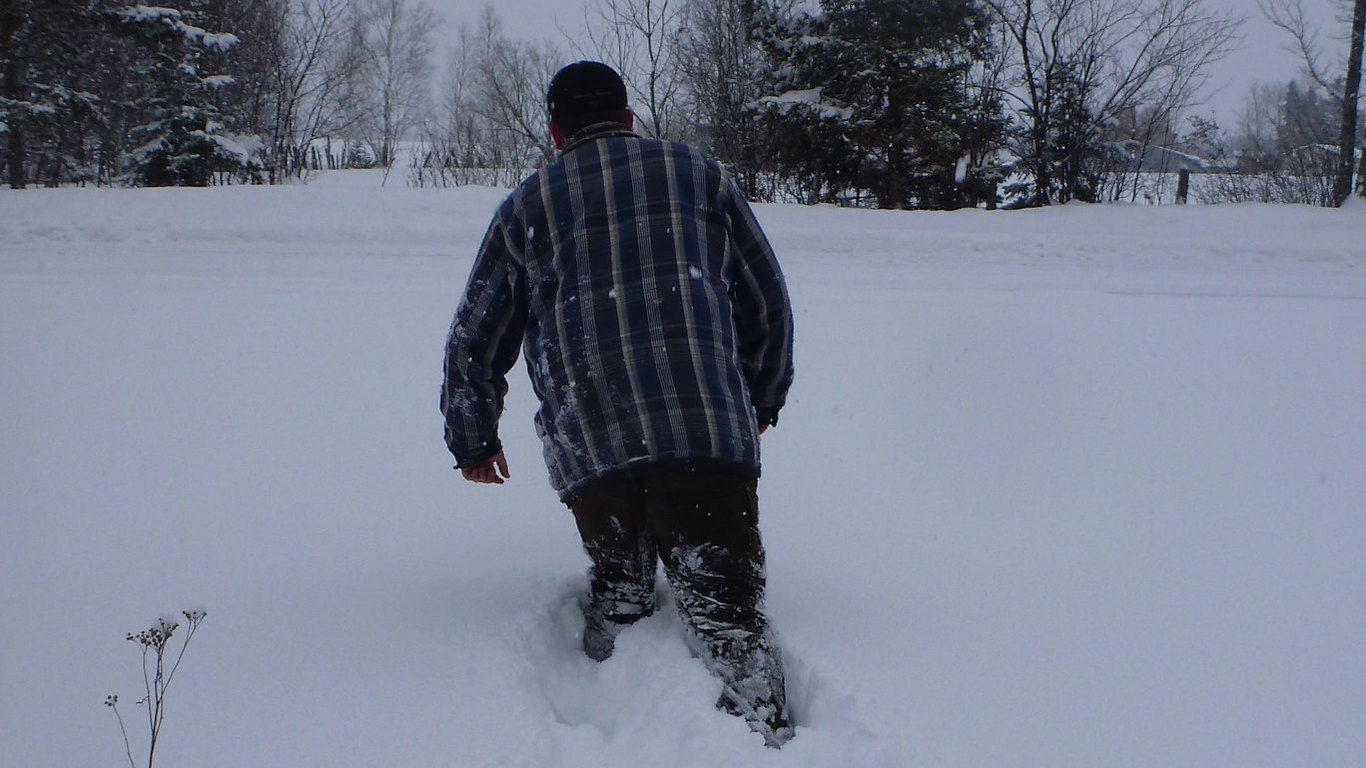
Wisconsin: Iron and Walworth
> County population: 5,715 and 103,013
> 1-day record: 2 feet, 2 inches on Mar 13, 2006 and February 2, 2011
> Station reporting: Upson and Pell Lake
> Station elevation: 456 and 256 feet
There is a two-way tie for Wisconsin’s biggest one-day snowfall record: Both Iron and Walworth recorded 2 feet 2 inches of snow in March 2006 and February 2011. At 26 inches, the snowfall on these days would have equalled approximately half or more of the typical annual snowfall for the state in an average winter.
[in-text-ad-2]
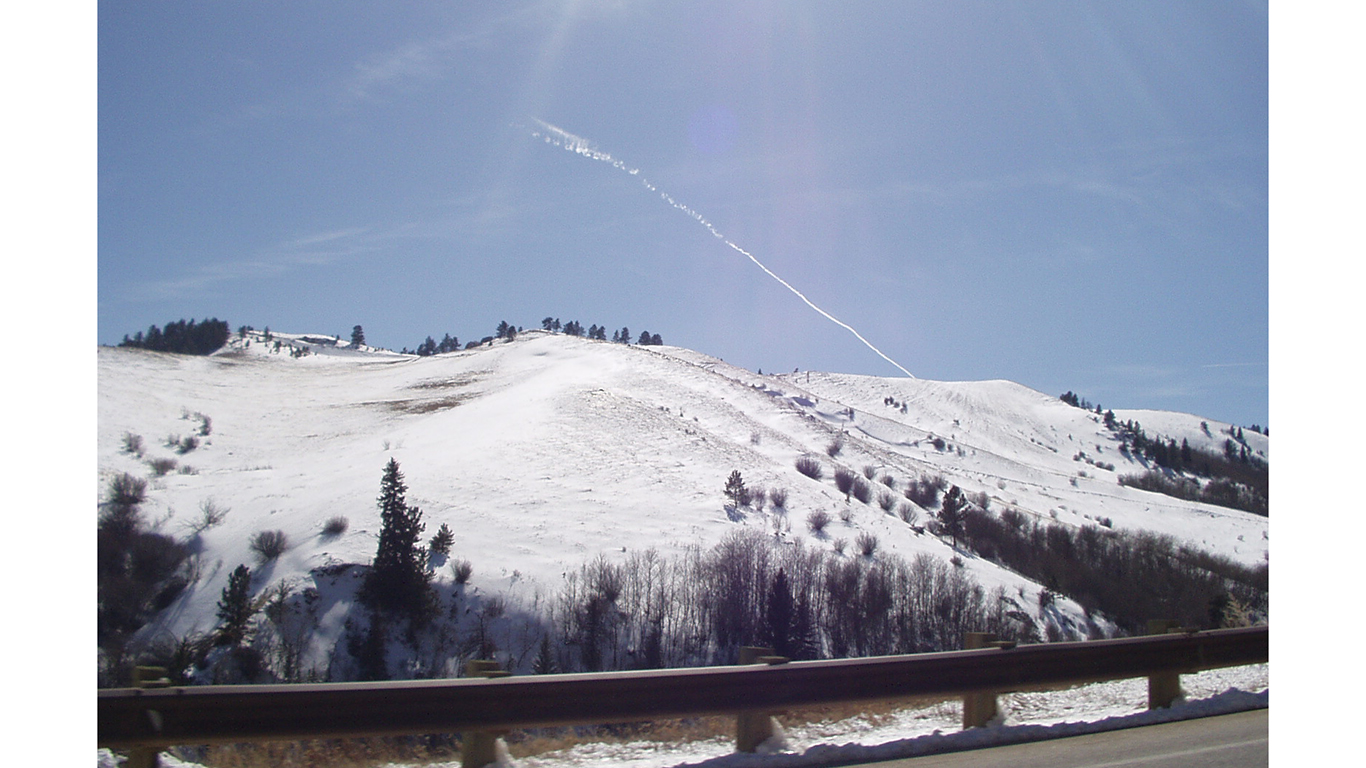
Wyoming: Johnson
> County population: 8,515
> 1-day record: 4 feet, 1 inches on Mar 21, 1924
> Station reporting: Hunters
> Station elevation: 2,257 feet
The Hunters weather station in Johnson County, which holds the record for Wyoming, recorded in a single day snow levels normally seen over the course of a month or more. Just over 4 feet of snow were recorded at the station on March 21, 1924. The county and state snowfall leader is the only record in the state the late winter storm of 1924 contributed to.
Let’s face it: If your money is just sitting in a checking account, you’re losing value every single day. With most checking accounts offering little to no interest, the cash you worked so hard to save is gradually being eroded by inflation.
However, by moving that money into a high-yield savings account, you can put your cash to work, growing steadily with little to no effort on your part. In just a few clicks, you can set up a high-yield savings account and start earning interest immediately.
There are plenty of reputable banks and online platforms that offer competitive rates, and many of them come with zero fees and no minimum balance requirements. Click here to see if you’re earning the best possible rate on your money!
Thank you for reading! Have some feedback for us?
Contact the 24/7 Wall St. editorial team.